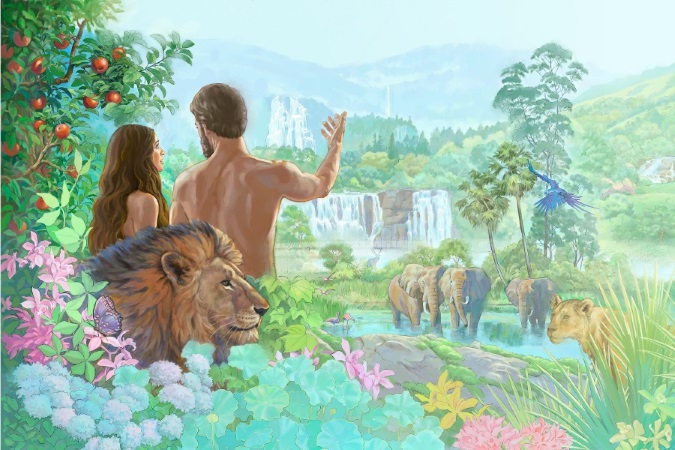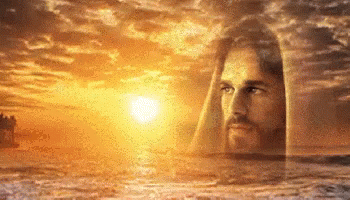The Old Testament Story Timeline
Welcome to the Old Testament Story’s Timeline
If you are looking for a book of the Old Testament, search by typing <Ctrl><f> and type in the name of the book. You should be able to find it here on this page pretty easily.
These Old Testament books are not in the order they appear in our Bibles (whether Hebrew, Greek, Urdu or English), but they are in the order that we are guessing they were written.
If your project is about one of the Psalms, click here
In the Beginning, God created Earth, humans & a LAND for BLESSING in His PRESENCE
In the Beginning, God created Earth, humans & then a LAND
The Prophet Malachi introduces God’s Great Salvation Story
In the Beginning, God created Earth, humans & then a LAND
In the beginning, God created everything
 In the beginning, God created the heavens and the earth. He set aside 6 days to create time, space, energy, matter, earth, land, oceans, plants, birds, fish and animals.
In the beginning, God created the heavens and the earth. He set aside 6 days to create time, space, energy, matter, earth, land, oceans, plants, birds, fish and animals.
After he made all of the animals on the 6th day, God made one more being.
In the Beginning, God created Earth, humans & then a LAND
God created humans to rule the earth and God blessed them
 God created the human race to be His representatives on earth. They were to rule on earth on His behalf. God created them to rule over the fish and birds and animals on the earth. This is what it means to be made in God’s image: They were God’s deputies.
God created the human race to be His representatives on earth. They were to rule on earth on His behalf. God created them to rule over the fish and birds and animals on the earth. This is what it means to be made in God’s image: They were God’s deputies.
So God created human beings, making them to be like himself. He created them male and female, blessed them, and said, “Have many children, so that your descendants will live all over the earth and bring it under their control. I am putting you in charge of the fish, the birds, and all the wild animals.”
Humans were created to receive God’s blessing…
In the Beginning, God created Earth, humans & then a LAND
God created a LAND
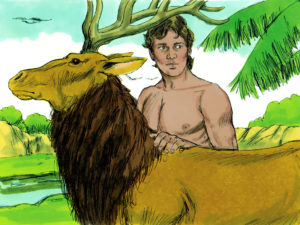 As the Man watched, God created a PLACE where humans could live. God named the PLACE “Eden.” At first, even though the rest of the earth was filled with animals and plants, Eden was only dirt. But God created plants in the garden and animals and the Man named the animals.
As the Man watched, God created a PLACE where humans could live. God named the PLACE “Eden.” At first, even though the rest of the earth was filled with animals and plants, Eden was only dirt. But God created plants in the garden and animals and the Man named the animals.
Then God created Woman from the rib of the Man. Both the Woman and the Man were God’s deputies who ruled the earth in His name.
God commanded them to care for this PLACE and to fill it with their children and grandchildren and many generations. As the humans grew in number, they would make the borders of Eden greater and greater until Eden filled the entire earth.
In the Beginning, God created Earth, humans & then a LAND
God’s PRESENCE was in that LAND
 The Garden of Eden was like a Temple, a place where God would come in His presence to have fellowship with the human beings. In the center of the garden there was a wonderful tree called the Tree of Life. If the humans chose to, they could eat from the fruit of the tree of life and live forever, always enjoying God’s perfect presence.
The Garden of Eden was like a Temple, a place where God would come in His presence to have fellowship with the human beings. In the center of the garden there was a wonderful tree called the Tree of Life. If the humans chose to, they could eat from the fruit of the tree of life and live forever, always enjoying God’s perfect presence.
The humans loved being in God’s PRESENCE, which gave them pure joy. This is why God created humans, so that they could love Him and each other in perfect fellowship.
In the Beginning, God created Earth, humans & then a LAND
But there was a TREE that was forbidden
But 2 Trees sat in the middle of the Land of Eden–the Tree of Life and the Tree of the Knowledge of Good and Evil.
The Tree of Life offered unending days and it is possible that if they had eaten from that first, they might never have sinned.
But God warned the man that they would die if they ate from the second tree, the Tree of the Knowledge of Good and Evil.
God laid before the 2 humans a choice: Obey God and live forever or Disobey God and die.
Into the LAND of Blessing, Came a Curse
In the LAND of Blessing, Came a Curse
The Prophet Malachi introduces God’s Great Salvation Story
In the LAND of Blessing, Came a Curse
The Snake encouraged Doubt
 The first 2 humans (the only humans on the planet) came face to face with someone who wanted them to doubt what God had said.
The first 2 humans (the only humans on the planet) came face to face with someone who wanted them to doubt what God had said.
The snake, who was in some way controlled by Satan, said to the woman, “Has God really said that you will die if you eat the fruit of the Tree of the Knowledge of Good and Evil? You will NOT die. God simply does NOT want you to be like Him, knowing good and evil!”
The snake was calling God a LIAR and wanted Eve to think that God did not truly love them enough to give them what is very best.
Into the LAND of Blessing, Came a Curse
Eve believed and acted on the LIE
 Eve believed the snake when he said that God was a LIAR and was NOT LOVING.
Eve believed the snake when he said that God was a LIAR and was NOT LOVING.
She wanted to believe this for three reasons: she thought the fruit would be tasty, she saw the fruit was pretty and she wanted to wise like God. She allowed these desires to influence the way she thought. Her desires led her to deny her faith that God loved them and would only tell them the truth.
Therefore, she ate the fruit and then gave some to her husband. We don’t know why he ate it except that Eve told him to do it and he listened to that.
Into the LAND of Blessing, Came a Curse
The humans became afraid of God’s PRESENCE
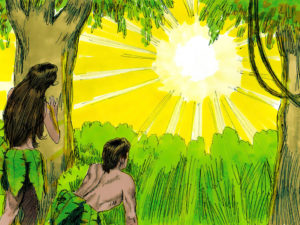 Something happened to the humans’ minds and eyes, so that they SAW everything differently. They saw things and thought they KNEW what good was and evil was, but THEY WERE ALWAYS WRONG!
Something happened to the humans’ minds and eyes, so that they SAW everything differently. They saw things and thought they KNEW what good was and evil was, but THEY WERE ALWAYS WRONG!
They saw that they were naked and that made them afraid, even though God made them naked and said it was good. The humans thought they knew that being naked was bad. This way of seeing and thinking which gives false knowledge still rules all humans in all places and at all times.
Then they heard the sound of God’s PRESENCE coming into the PLACE of Eden. Before they ate the fruit, God’s presence gave them joy, but now they were horribly afraid and they hid themselves.
Into the LAND of blessing, came a curse
The Fruit of the Tree poisoned the hearts and minds of humanity
 Now God’s perfect world was no longer GOOD, because God’s representatives, His deputies, were now poisoned in their minds and eyes. They saw the world through the false knowledge of good and evil and they lived in the world according to their desires to satisfy their hunger, to get for themselves what was pretty and to brag to the world about how wise they were.
Now God’s perfect world was no longer GOOD, because God’s representatives, His deputies, were now poisoned in their minds and eyes. They saw the world through the false knowledge of good and evil and they lived in the world according to their desires to satisfy their hunger, to get for themselves what was pretty and to brag to the world about how wise they were.
Into the LAND of Blessing, Came a Curse
God expelled humans from the LAND of His Blessing
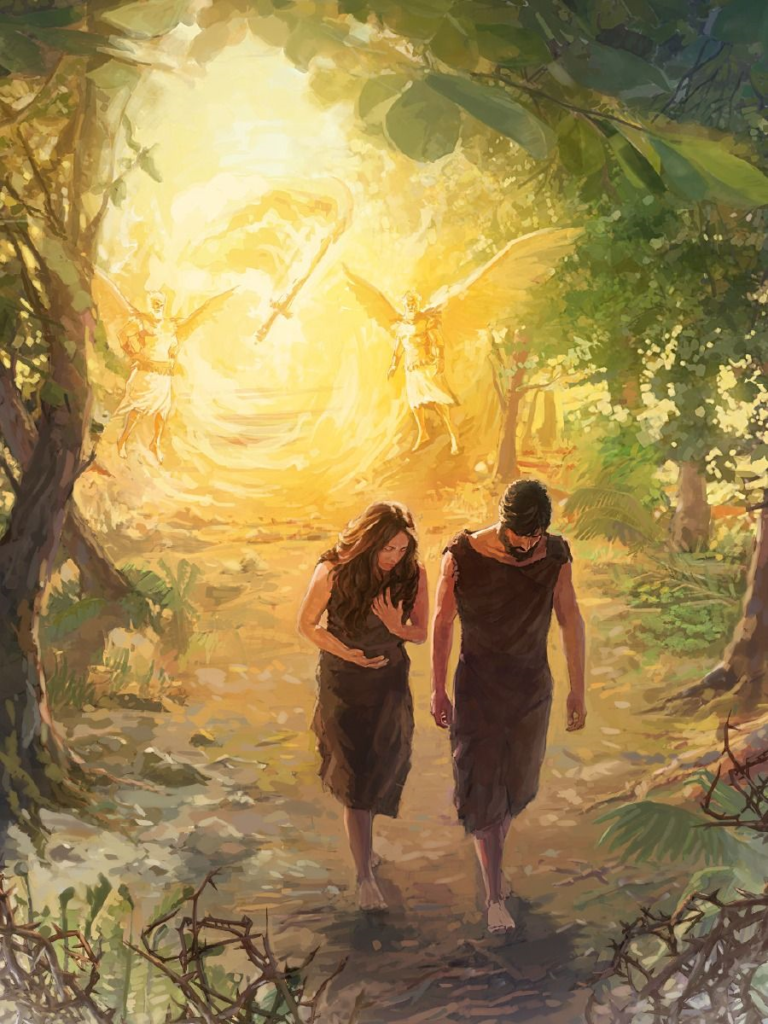
Once they were no longer clean before God, humans wanted to HIDE from God’s PRESENCE.
The results of their sin were horrible:
- the ground of the LAND was now cursed with thorns
- humans must sweat and work hard to grow food
- child-bearing would now bring physical pain and emotional grief
- humans began to die at that moment
Such people could not live in the LAND of God’s PRESENCE; they might eat fruit from the Tree of Life and live forever in such a horrible way of life.
Everything seemed hopeless and lost…
Into death, came the Promise of a SEED
In the Place of Blessing, Came a Curse
The Prophet Malachi introduces God’s Great Salvation Story
Into death, came the Promise of a SEED
God promised that Eve would have a SEED
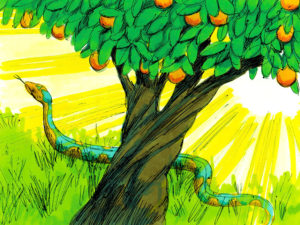 As God cursed the snake, He gave Hope to the two humans.
As God cursed the snake, He gave Hope to the two humans.
“ Then the Lord God said to the snake, “You will be punished for this; you alone of all the animals must bear this curse: from now on you will crawl on your belly, and you will have to eat dust as long as you live. 15 I will make you and the woman hate each other; her seed and yours will always be enemies. Her seed will crush your head, and you will bite her offspring’s heel.”” (Genesis 3:14–15)
Someday, Eve’s descendant, her seed, would crush the serpent’s head, even as the serpent bit that descendant’s heel.
God’s Great Salvation Story
The Bible is the story of how the SEED redeemed the human race from sin and death
The Bible, from Genesis 3:15 to the last chapter of Revelation is about that SEED, the Lamb of God…
Promised to Eve
Pledged to Abraham
Predicted by the Prophets
Prepared for by John the Baptist
Presented in Jesus Christ, the Lamb of God
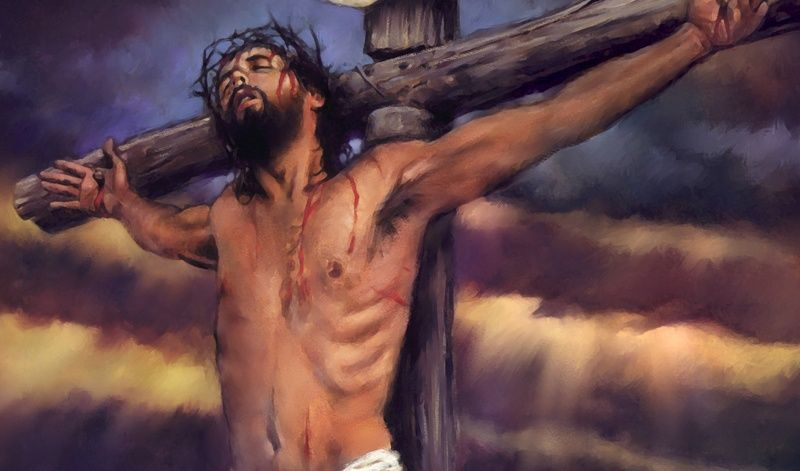
God’s Great Salvation Story
The seed passed from generation to generation
Adam had a son named Seth. Seth had lots of sons and daughters, but the Bible only mentions Enosh. Enosh had lots of sons and daughters, but the Bible only mentions Kenan. Kenan also had lots of sons and daughters, but the Bible only mentions Mehalalel.
The reason is simple: Each of these sons mentioned here passed the SEED of Eve to the next generation. Seth passed the SEED of Eve to Enosh, who passed the SEED to Kenan, who passed the SEED to Mehalalel.
That same story about the SEED of Eve comes to the New Testament. Both Matthew and Luke tell how the SEED ended up with Jesus Christ, the final and true SEED of Eve, who crushed Satan’s head through His cross and resurrection.Luke’s list describes how the SEED of Eve came to Mary and Matthew’s list describes how the SEED of Eve came to Jesus’ adopted father Joseph.
So the Bible is a story of how God’s promise that Eve’s SEED would crush Satan’s head, but it is not a pretty story at all. Some of these SEED bearers were the worst sort of people: murderers, traitors, idol-worshipers, liars and even worse! That’s what makes God’s Great Salvation Story different from any other, because it is not about heroes and holy men; it’s about ONE hero, Jesus Christ and ONE holy man, Jesus Christ. All of the rest prepared the way for His coming into the world to save humanity from our sin!
God’s Great Salvation Story
The Bible’s Story: God’s PRESENCE, The LAND of Blessing, The SEED of Eve
Job: maybe the first written book of the Bible during the time of Abraham?
The Book of Job
Job
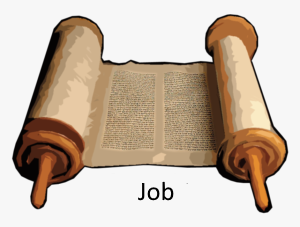 Who wrote Job?
Who wrote Job?
The book of Job is about people who seem to have lived at the same general time as Abraham. We are told that Job was famous for being a righteous man. But we don’t know who wrote the book.
When did the original author write Job?
This book could have been written during the days of Job (making it the most ancient book of the Bible). It also could have been written after the exile. It is impossible to guess.
Who were the original readers of Job?
Since we do not know when Job was written, we cannot know who the original readers of Job were.
What led the original author to write Job?
Clearly the author wanted his readers to understand that the bad things often happen to good people and good things as well often happen to bad people. The author wanted his readers to find both comfort and to hold back from judging people who were experiencing bad things.
What did the original author want to change in his original readers?
Clearly the original author wanted his original readers to share Job’s own experience by the end of the book when Job confessed: “In the past I knew only what others had told me, but now I have seen you with my own eyes. So I am ashamed of all I have said and repent in dust and ashes.” (Job 42:5–6) The author wanted his readers to discover the wonders of knowing the infinite and mighty God who created and sustains everything in the universe yet still works in the lives of people.
God made a covenant/contract with Abraham & his SEED
God made a covenant/contract with Abraham & his SEED
The Prophet Malachi introduces God’s Great Salvation Story
God made a covenant/contract with Abraham & his SEED
God called Abram & Sarai to move to a LAND
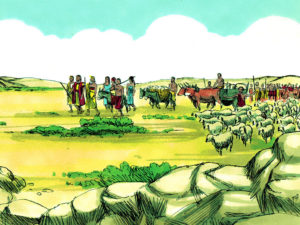
God called Abram and his wife Sarai to leave their country and go a new LAND. The name of the new land was Canaan and many people lived there.
Abram and Sarai obeyed and journeyed to the LAND.
Abram was 75 years old and Sarai was 65.
God made a covenant/contract with Abraham & his SEED
God made many promises to Abram
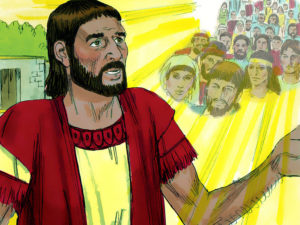 Abram and Sarai had never had children. God made promises to Abram:
Abram and Sarai had never had children. God made promises to Abram:
- I will give you many descendants,
- and they will become a great nation.
- I will bless you
- and make your name famous,
- so that you will be a blessing.
- I will bless those who bless you,
- But I will curse those who curse you.
- This is the country that I am going to give to your descendants
The most important of all these promises, however, was in Genesis 12:3
And through you I will bless all the nations
God made a covenant/contract with Abraham & his SEED
God made a LAND covenant/contract with Abram
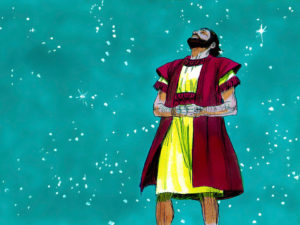 Later on, Abram said to God, “Sovereign Lord, what good will your reward do me, since I have no children?”
Later on, Abram said to God, “Sovereign Lord, what good will your reward do me, since I have no children?”
The Lord took him outside and said, “Look at the sky and try to count the stars; you will have as many descendants as that.” Abram put his trust in the Lord, and because of this the Lord was pleased with him and accepted him.
Therefore, God made a covenant/contract with Abram, using a LAND contract ceremony which was familiar to people living in Abram’s area.
God made a covenant/contract with Abraham & his SEED
When Abram was 99 and Sarai was 89, God changed their names
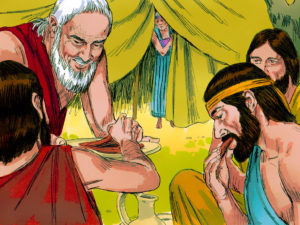 God came to Abram as the Messenger of the Lord, along with 2 angels. God promised Abram that in 1 year Sarah would give birth to a son whom they would name Isaac.
God came to Abram as the Messenger of the Lord, along with 2 angels. God promised Abram that in 1 year Sarah would give birth to a son whom they would name Isaac.
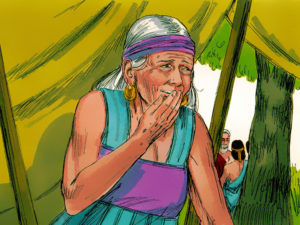
God gave Abram the name Abraham and Sarai the name Sarah.
God made a covenant/contract with Abraham & his SEED
When Abraham was 100 and Sarah was 90, Isaac was born
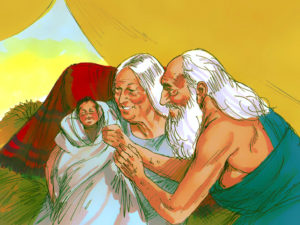 God fulfilled His promise to Abraham and Sarah and 25 years after God first spoke to Abraham, his beloved son Isaac was born.
God fulfilled His promise to Abraham and Sarah and 25 years after God first spoke to Abraham, his beloved son Isaac was born.
After 8 days, Abraham circumcised Isaac. Circumcision was a way of symbolizing the SEED of Eve.
God had promised Abraham and Sarah that they would have a son and God had fulfilled that promise. Now Abraham knew that God always kept His promises.
God made a covenant/contract with Abraham & his SEED
When God tested Abraham’s faith, Abraham believed God’s promises
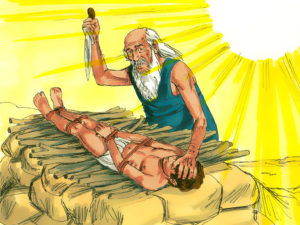 Some time later, God commanded Abraham to bring his son Isaac to a place in the mountains and sacrifice him there. After traveling for 3 days, Abraham and Isaac went to the top of one of the mountains. There Abraham built an altar for sacrifice. He tied up Isaac and laid him on the altar. He raised his knife to kill his son.
Some time later, God commanded Abraham to bring his son Isaac to a place in the mountains and sacrifice him there. After traveling for 3 days, Abraham and Isaac went to the top of one of the mountains. There Abraham built an altar for sacrifice. He tied up Isaac and laid him on the altar. He raised his knife to kill his son.
How could he do this?
He knew that God had promised that Isaac would have many descendants. Even if Abraham killed Isaac, he knew God would keep that promise and raise Isaac back from the dead.
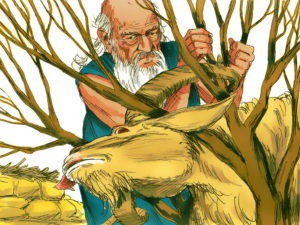 At the last second, God stopped Abraham from killing his son. God provided an animal, caught by its horns in a bush. Abraham sacrificed that animal in place of his son. Abraham’s faith was right; he could trust that God will always fulfill His promises.
At the last second, God stopped Abraham from killing his son. God provided an animal, caught by its horns in a bush. Abraham sacrificed that animal in place of his son. Abraham’s faith was right; he could trust that God will always fulfill His promises.
God again made His promise of blessing to all the families of the earth.
“In your SEED all the nations of the earth shall be blessed, because you have obeyed My voice.”
The SEED passed from Abraham’s son, Isaac, to Jacob to Judah
In the Beginning
The Prophet Malachi introduces God’s Great Salvation Story
The SEED passed from Isaac to Jacob to Judah
Isaac’s grandson Jacob had 12 sons
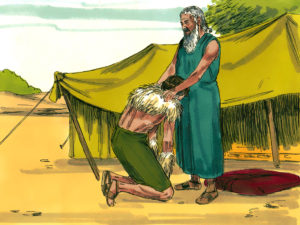
When Isaac was old and almost blind, he tried to pass the SEED to his favorite son, Esau. God had already revealed, however, that He had chosen Jacob, even though Jacob was the younger son. God made sure that it was Jacob, not Esau, who received his father’s blessing.
Over many years, Jacob lived away from the promised LAND, because he was afraid of his brother Esau. Finally, however, Jacob returned with his entire family.
The SEED passed from Isaac to Jacob to Judah
God chose Judah as the bearer of the SEED
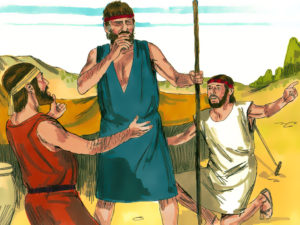 God did not choose Reuben, the oldest son, to bear the seed. Neither did He choose Joseph, the godliest son, to bear the seed. Instead, he chose Judah, Jacob’s 4th son. Judah was neither godly nor wise, but he was still God’s choice.
God did not choose Reuben, the oldest son, to bear the seed. Neither did He choose Joseph, the godliest son, to bear the seed. Instead, he chose Judah, Jacob’s 4th son. Judah was neither godly nor wise, but he was still God’s choice.
God brought Jacob’s family out of the LAND & into Egypt
Joseph brought the family to Egypt
Joseph’s jealous brothers sold him as a slave
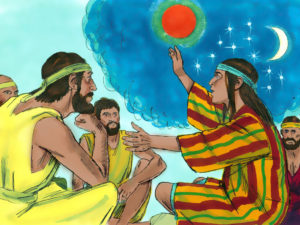 Jacob’s favorite son was Joseph, who was different from all of his other brothers. God gave 2 amazing dreams to Joseph, dreams which predicted that one day all of his brothers would bow down before him.
Jacob’s favorite son was Joseph, who was different from all of his other brothers. God gave 2 amazing dreams to Joseph, dreams which predicted that one day all of his brothers would bow down before him.
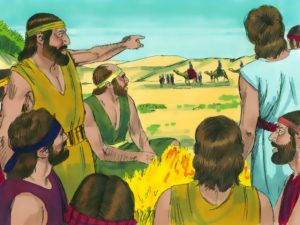 And that made his brothers hate him. When he was 17 years old, Joseph’s brothers sold him as a slave and then told their father he was killed by wild animals. The slave traders took him to Egypt where he worked as a slave for many years.
And that made his brothers hate him. When he was 17 years old, Joseph’s brothers sold him as a slave and then told their father he was killed by wild animals. The slave traders took him to Egypt where he worked as a slave for many years.
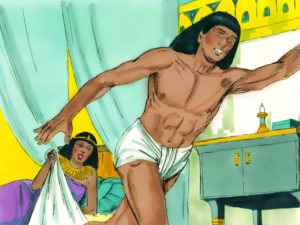 Because Joseph was faithful to God, when his master’s wife tried to seduce him, he said no. She then falsely accused him of trying to rape her. His master put in him prison, where he suffered for many years. Even in the worst times, however, Joseph continued to trust in God.
Because Joseph was faithful to God, when his master’s wife tried to seduce him, he said no. She then falsely accused him of trying to rape her. His master put in him prison, where he suffered for many years. Even in the worst times, however, Joseph continued to trust in God.
Joseph brought the family to Egypt
Joseph became the 2nd highest ruler in Egypt
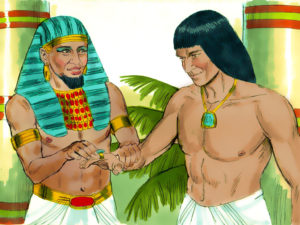 Joseph spent many years in prison. When 2 fellow prisoners told Joseph about strange dreams they had, Joseph interpreted their dreams correctly. After 2 years, the Pharaoh (i.e., king) of Egypt had an upsetting dream and found out that Joseph was able to interpret. God gave the interpretation of the dream and Pharaoh believed him and made Joseph the second most powerful official in Egypt.
Joseph spent many years in prison. When 2 fellow prisoners told Joseph about strange dreams they had, Joseph interpreted their dreams correctly. After 2 years, the Pharaoh (i.e., king) of Egypt had an upsetting dream and found out that Joseph was able to interpret. God gave the interpretation of the dream and Pharaoh believed him and made Joseph the second most powerful official in Egypt.
Joseph brought the family to Egypt.
Jacob and his family left the LAND to live in Egypt
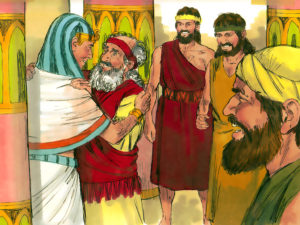 9 years later, during a terrible famine, Joseph’s brothers came to Egypt, trying to buy food. Joseph now dressed like an Egyptian and the brothers did not know him. When they came back a year later, Joseph revealed himself to them and they were amazed.
9 years later, during a terrible famine, Joseph’s brothers came to Egypt, trying to buy food. Joseph now dressed like an Egyptian and the brothers did not know him. When they came back a year later, Joseph revealed himself to them and they were amazed.
When he was 17, Joseph had dreamed that his brothers one day would bow down to him. Now he was 40 years old, and those dreams had been perfectly fulfilled.
God had revealed that this famine would last another 5 years, so Joseph brought his father and family to stay with him in Egypt in the land of Goshen. Jacob’s family was tiny, 72 people, and they moved to Egypt in Goshen and shepherded their sheep and cattle there in Goshen.
Jacob and his family left the LAND to live in Egypt
Jacob’s descendants lived in Egypt, away from the PROMISED LAND for over 400 years
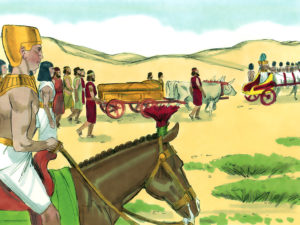 Over the next 400 years, Jacob’s little family of about 70 people grew to a great nation of 2 million! They lived in the rich land of Goshen and did very well.
Over the next 400 years, Jacob’s little family of about 70 people grew to a great nation of 2 million! They lived in the rich land of Goshen and did very well.
But then Pharaoh died, as well as Joseph and his brothers. And a new Pharaoh arose, one who did not know Joseph and this Pharaoh began to fear the Hebrews, because there were so many of them and they were not Egyptians.
As good a land as Goshen was, it was NOT the LAND promised to Abraham so many years before. Therefore, God began a plan to bring Abraham’s children out from Egypt and back to the Promised LAND.
God sent Moses to tell Pharaoh to let the Hebrews go
God sent Moses to tell Pharaoh to let the Hebrews go
The Egyptians made the Hebrews slaves
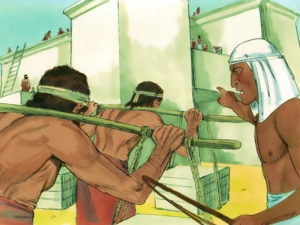 The new Pharaoh worried that too many Hebrews (also known as Israelites) lived in Egypt. He worried that if war with an enemy happened, the Hebrews might join Egypt’s enemies. Therefore, Pharaoh decided to make the Hebrews weak. He murdered their baby boys, but killing the babies did not help. The Hebrews did not stop having many children. Then Pharaoh put hard slave masters over them. They made the Hebrews’ lives painful and filled with hard work. Pharaoh had them build cities.
The new Pharaoh worried that too many Hebrews (also known as Israelites) lived in Egypt. He worried that if war with an enemy happened, the Hebrews might join Egypt’s enemies. Therefore, Pharaoh decided to make the Hebrews weak. He murdered their baby boys, but killing the babies did not help. The Hebrews did not stop having many children. Then Pharaoh put hard slave masters over them. They made the Hebrews’ lives painful and filled with hard work. Pharaoh had them build cities.
God sent Moses to tell Pharaoh to let the Hebrews go
Moses was born a Hebrew, but grew up in Pharaoh’s house
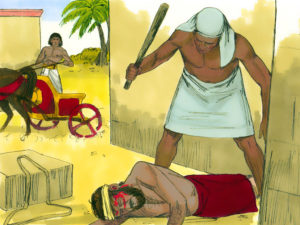 Moses was born as a Hebrew. However, he was raised by Pharaoh’s daughter. When he was forty years old, he went to watch his people, the Hebrews. He saw an Egyptian beating one of his relatives and in anger, Moses killed him and buried him in the sand. However, Pharaoh heard about this and tried to kill Moses. Moses ran away to a land far away and lived with a shepherd who was also a priest. Moses married the man’s daughter, Zipporah.
Moses was born as a Hebrew. However, he was raised by Pharaoh’s daughter. When he was forty years old, he went to watch his people, the Hebrews. He saw an Egyptian beating one of his relatives and in anger, Moses killed him and buried him in the sand. However, Pharaoh heard about this and tried to kill Moses. Moses ran away to a land far away and lived with a shepherd who was also a priest. Moses married the man’s daughter, Zipporah.
God sent Moses to tell Pharaoh to let the Hebrews go
God’s PRESENCE returned to the earth in a burning bush
 The Hebrews (also known as Israelites) called God to save them. God heard their prayers and remembered his covenant. God decided to send Moses to save them. Moses had been a shepherd for 40 long years. He came to the Mountain of God, which was named Horeb. The Messenger of the Lord appeared to him in a burning bush. The bush surprised Moses, who wondered why it was not burned up. He went to see it.
The Hebrews (also known as Israelites) called God to save them. God heard their prayers and remembered his covenant. God decided to send Moses to save them. Moses had been a shepherd for 40 long years. He came to the Mountain of God, which was named Horeb. The Messenger of the Lord appeared to him in a burning bush. The bush surprised Moses, who wondered why it was not burned up. He went to see it.
God sent Moses to tell Pharaoh to let the Hebrews go
God told Moses he had to go back to Egypt
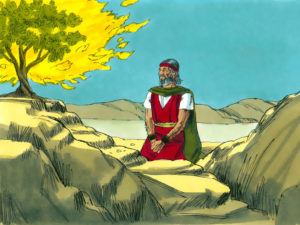 Then God said, “I have seen hard life in Egypt and have come down to rescue them. I will bring them to a rich land. I am sending you to Pharaoh to bring the Israelites out of Egypt”.
Then God said, “I have seen hard life in Egypt and have come down to rescue them. I will bring them to a rich land. I am sending you to Pharaoh to bring the Israelites out of Egypt”.
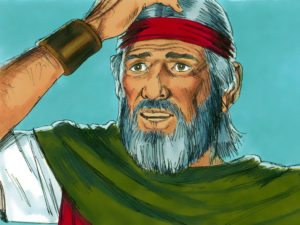 Moses said he could not go. He said he could not speak well and gave God reasons why this was not possible.
Moses said he could not go. He said he could not speak well and gave God reasons why this was not possible.
God, however, answered every reason. God also showed Moses miracles that he would do when he went to talk to Pharaoh.
God sent Aaron to meet Moses and Moses told him everything God had said and done. Then the two brothers went to Egypt met with leaders of the Hebrews. Aaron told them everything God had told Moses. The leaders believed God had seen their pain and they bowed and worshiped God.
God rescued the Hebrews out of Egypt
God rescued the Hebrews out of Egypt
Moses & Aaron went to Pharaoh
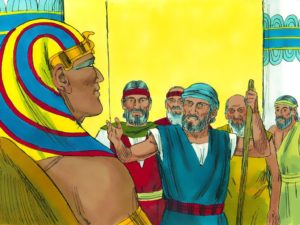 Moses and Aaron met Israel’s leaders. They told them what God said and did. Moses and Aaron went to Pharaoh and said to him, “The Lord says, `Let my people go so they may hold festival in the desert.” Pharaoh said, “I do not know this Lord. You are stopping these Hebrews from doing their work”! Therefore, Pharaoh told his slave masters, “No longer give these Hebrews straw for making their bricks. Let them get the straw themselves”. When the Hebrews were slower making bricks, their slave masters beat them. The work leaders asked “Why are you beating us”? Pharaoh said “You are lazy! You want to go worship your God”.
Moses and Aaron met Israel’s leaders. They told them what God said and did. Moses and Aaron went to Pharaoh and said to him, “The Lord says, `Let my people go so they may hold festival in the desert.” Pharaoh said, “I do not know this Lord. You are stopping these Hebrews from doing their work”! Therefore, Pharaoh told his slave masters, “No longer give these Hebrews straw for making their bricks. Let them get the straw themselves”. When the Hebrews were slower making bricks, their slave masters beat them. The work leaders asked “Why are you beating us”? Pharaoh said “You are lazy! You want to go worship your God”.
God rescued the Hebrews out of Egypt
God brought 10 terrible punishments on Pharaoh & Egypt
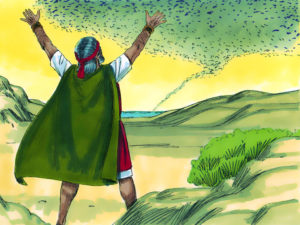
God sent Moses and Aaron to warn Pharaoh that God would punish Egypt. Pharaoh, however, was a proud king ruling over a mighty nation. Pharaoh worshiped his own gods; he would not submit to the God of his Hebrew slaves. Moses and Aaron said to Pharaoh, “You must send us or bad things will happen to Egypt”!
God sent 10 terrible punishments. Each time God gave Pharaoh chance to let the Hebrews go, but Pharaoh did not let them go out.
God rescued the Hebrews out of Egypt
God told each household to sacrifice a Lamb to save them from Death
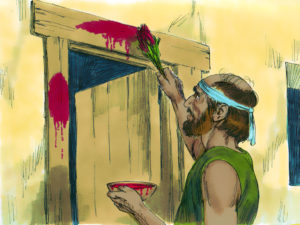 Finally, God sent a final punishment. Moses warned Pharaoh, “God will kill the firstborn son in every house in Egypt. He will kill the firstborn of the cattle as well. However, nothing bad to Israelites. You will know Lord punishing Egypt.” However, Pharaoh did not listen.
Finally, God sent a final punishment. Moses warned Pharaoh, “God will kill the firstborn son in every house in Egypt. He will kill the firstborn of the cattle as well. However, nothing bad to Israelites. You will know Lord punishing Egypt.” However, Pharaoh did not listen.
Moses told the Hebrews get ready. Every family was to take a healthy lamb and sacrifice the lamb. They were to paint the lamb’s blood on the side and top of the door frame. They were to roast and eat the meat of the lamb. No one could leave their homes until morning.
This lamb and its blood represent the SEED who would save all humans from slavery to Satan and from death because of sin.
Israelites obeyed; at midnight the Lord killed every firstborn in Egypt who was not protected by the blood of the lambs. All firstborns died—firstborn of Pharaoh and the firstborn of the prisoner in jail. No house was without someone dead if it was not protected by the blood! This event was called Passover.
God rescued the Hebrews out of Egypt
Pharaoh told Moses and the Hebrews to leave Egypt
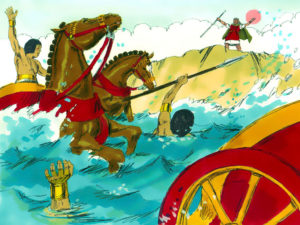 Pharaoh’s own first born son died that night. So Pharaoh commanded Moses & Aaron, “Take your people and flocks and leave”! The Egyptians wanted get rid of them, so that when the Hebrews asked for silver and gold and clothing, the Lord made the Egyptians gladly give to them. The Hebrews (Israelites) left Egypt with 2 ½ million people. They had lived in Egypt for 430 years. After 430 years to the day, the Hebrews left Egypt.
Pharaoh’s own first born son died that night. So Pharaoh commanded Moses & Aaron, “Take your people and flocks and leave”! The Egyptians wanted get rid of them, so that when the Hebrews asked for silver and gold and clothing, the Lord made the Egyptians gladly give to them. The Hebrews (Israelites) left Egypt with 2 ½ million people. They had lived in Egypt for 430 years. After 430 years to the day, the Hebrews left Egypt.
Foolishly, Pharaoh changed his mind and tried to stop them from going. God, however, protected the Hebrews and destroyed Pharaoh’s army. After this, the Hebrews were free.
God Made a Covenant Contract with Israel and Gave the Law
God Made a Covenant Contract with Israel and Gave the Law
The Hebrews came to Mount Sinai and stayed there for almost a year
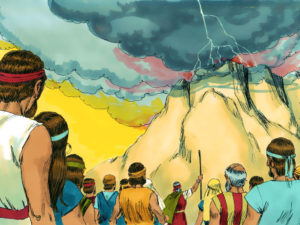 Now that the Hebrews were safely escaped from Egypt, they found themselves in a wilderness. God had to feed and bring water to the 2 1/2 million people who had crossed the Red Sea to their freedom. God miraculously supplied them with food which came down from the skies every morning; they called the food manna. God also miraculously supplied all the water they needed.
Now that the Hebrews were safely escaped from Egypt, they found themselves in a wilderness. God had to feed and bring water to the 2 1/2 million people who had crossed the Red Sea to their freedom. God miraculously supplied them with food which came down from the skies every morning; they called the food manna. God also miraculously supplied all the water they needed.
After 44 days, the Hebrews reached Mount Sinai, also known as Mount Horeb. This is where God had first appeared to Moses in the burning bush. Israel stayed there at the mountain for almost a year.
God Made a Covenant Contract with Israel and Gave the Law
God made a covenant-contract with Israel
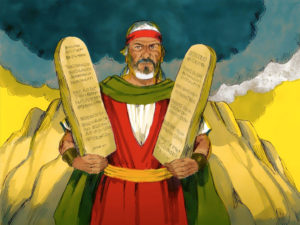 From the start, God had said that He was rescuing the Hebrews so He could bring them to the LAND he had promised to Abraham.
From the start, God had said that He was rescuing the Hebrews so He could bring them to the LAND he had promised to Abraham.
God told Moses to prepare the people for a special meeting with Himself. In this meeting, He spoke directly to the people and gave them rules which they would have to follow if they expected to stay in the Promise LAND. God made a covenant-contract with the people. If they did their part (following God’s Law), then they could stay in the LAND and experience God’s blessing.
God Made a Covenant Contract with Israel and Gave the Law
The Law was a way to show that the Hebrews belonged to God
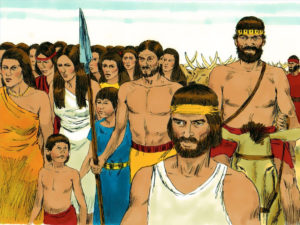 Everyone could see that God’s PRESENCE was with the Hebrews through the towering pillar of cloud/fire. God had set aside the Hebrews as His special possession. God wanted to make sure that all nations understood that the Hebrews belonged God in a way very different from any other nation. This is the second important purpose of the Law–to show the world that the Hebrews were God’s own possession. This is exactly what the word “holy” means. The Hebrews were holy, they were God’s special possession.
Everyone could see that God’s PRESENCE was with the Hebrews through the towering pillar of cloud/fire. God had set aside the Hebrews as His special possession. God wanted to make sure that all nations understood that the Hebrews belonged God in a way very different from any other nation. This is the second important purpose of the Law–to show the world that the Hebrews were God’s own possession. This is exactly what the word “holy” means. The Hebrews were holy, they were God’s special possession.
Even though all of the world and everyone in it belong to God, the Law set the Hebrews apart as God’s people in a special way. Many of the Laws in the Torah (the first 5 books of the Old Testament) told the Hebrews what they should do to show others they belonged to God. These Laws talked about their clothing, their food, their relationships and many other things.
God Made a Covenant Contract with Israel and Gave the Law
Israel agreed to the covenant-contract and it was sealed by sacrifices
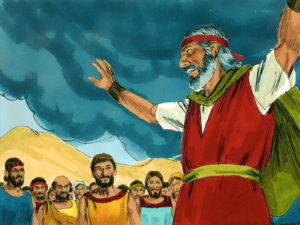 God gave the Hebrews His Law in a covenant-contract ceremony that they could understand, because it was common in their day. God acted as a Great King and the people acted as a conquered nation. God made promises of blessings and then He gave the people His rules they must follow if they wanted His blessings.
God gave the Hebrews His Law in a covenant-contract ceremony that they could understand, because it was common in their day. God acted as a Great King and the people acted as a conquered nation. God made promises of blessings and then He gave the people His rules they must follow if they wanted His blessings.
Moses read to the people everything which God had commanded. The people all shouted, “All that the Lord has commanded we will do!”
Then Moses made many sacrifices, which was also a common part of covenant-contracts in those days.
God was telling the Hebrews they were now His chosen people.
5 Books of Moses
Genesis
Moses wrote Genesis to answer the most important questions all human beings would have.
- Who was Yahweh, this God who had rescued them?
- What was Yahweh’s relationship to creation?
- What was Yahweh’s relationship to the gods?
- Who were human beings and why were they in the world?
- What was the relationship between human beings and Yahweh?
- What was the relationship between human beings and earth?
- Why was there so much suffering in the world?
- What was sin and why was there so much sin in the world?
- How did Yahweh deal with sin?
- Was there any hope for humans in a world so corrupted by sin?
Moses also wrote Genesis to answer the most important questions the Hebrew people would have.
- Who were the Hebrews, these people who have just escaped slavery in Egypt?
- Who were the Hebrews ancestors? What was their story?
- Why had the Hebrews been in slavery in Egypt?
- What was Yahweh’s relationship with the Hebrews?
- What was the heart of a right relationship between Yahweh and His people?
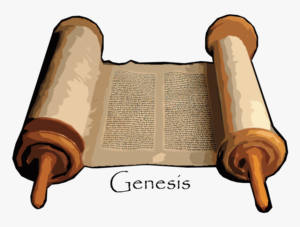 Who wrote Genesis? Moses, brother of Miriam and Aaron.
Who wrote Genesis? Moses, brother of Miriam and Aaron.
When did Moses write Genesis? Moses wrote Genesis during the Hebrews’ journeys in the wilderness. This was AFTER their rescue from slavery in Egypt and BEFORE their entry into the promised land of Canaan.
Who were the original readers of Genesis? 2.5 Million Hebrews, who had been slaves in Egypt for centuries. God had rescued them and brought them out of their slavery through mighty miracles. They were now in the wilderness, led by Moses and needed to understand many truths about God and themselves.
What led Moses to write Genesis? After 4 centuries of seeing themselves as lowly slaves, the Hebrews needed to understand Yahweh, the God who had delivered them. They needed to understand their own identity as humans and as descendants of Abraham. They needed to understand the situation of all humans in slavery to sin. And they needed to understand God’s promise of hope–the seed of Eve.
What did Moses want to change in his original readers? Moses wanted the Hebrews to have a right relationship with Yahweh like Abraham’s, based on faith in God’s covenant promises. He wanted them to know why and how they could trust Yahweh and be ready to enter the Land Yahweh had promised to Abraham.
The Hebrews made a tent/temple for His PRESENCE
The Hebrews made a tent/temple for God’s PRESENCE
God’s PRESENCE came to the Hebrews
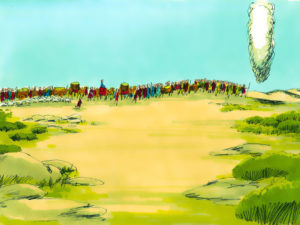 When God created the universe, He created a special land called Eden. God’s presence was in Eden in a special way, so that Adam and Eve could have personal fellowship with God and not be afraid.
When God created the universe, He created a special land called Eden. God’s presence was in Eden in a special way, so that Adam and Eve could have personal fellowship with God and not be afraid.
But, you will remember, Adam and Eve ate the fruit, which poisoned their hearts and minds. God therefore forced humanity (i.e., Adam and Eve, the parents of all humans) to leave the PLACE of God’s PRESENCE and go out into the world without God’s presence. For thousands of years, humanity was completely separate from God’s presence.
That began to change when God met with Moses.
The PRESENCE of God first returned to earth when God appeared to Moses in the burning bush. As the Hebrews began their journey from the land of Goshen in Egypt, God’s PRESENCE came to them in a towering cloud that reached from the sky to earth.
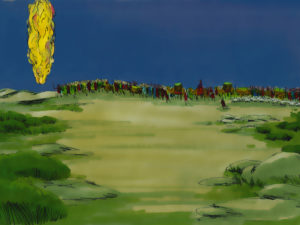 Every night, this became fire, which gave them light, warmth in the cold desert air and protection from wild animals. That cloud/fire stayed with Israel for 40 days.
Every night, this became fire, which gave them light, warmth in the cold desert air and protection from wild animals. That cloud/fire stayed with Israel for 40 days.
Anyone who saw the great crowd of Hebrews would see that cloud/fire and know that the PRESENCE of God was with them.
The Hebrews made a tent/temple for God’s PRESENCE
God commanded the Hebrews to make a tent/temple
 God commanded the Hebrews to construct a tent/temple. Much of this tent/temple was made from materials the Hebrews had received as gifts from the Egyptians.
God commanded the Hebrews to construct a tent/temple. Much of this tent/temple was made from materials the Hebrews had received as gifts from the Egyptians.
The tent/temple (sometimes in English Bibles called a tabernacle) was a place for God’s presence to dwell among them in a way which would protect them from seeing God’s holy presence.
The Hebrews made a tent/temple for God’s PRESENCE
God’s PRESENCE would dwell in the tent/temple
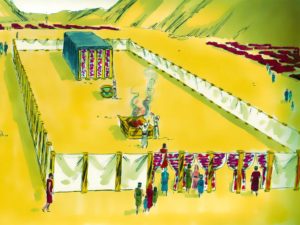 During their time at Mount Sinai, God gave His perfect plan for a tent/temple. God promised to dwell in the tent/temple in a way different from the burning bush and the pillar of cloud/fire.
During their time at Mount Sinai, God gave His perfect plan for a tent/temple. God promised to dwell in the tent/temple in a way different from the burning bush and the pillar of cloud/fire.
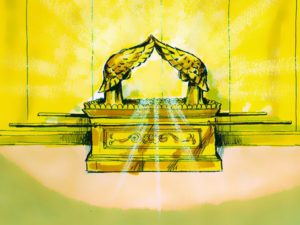 The most important part of the tent/temple would be a special room called the Most Holy Place (or Holy of Holies). Here God’s PRESENCE would dwell and it was so sacred that anyone who looked on God’s PRESENCE would die.
The most important part of the tent/temple would be a special room called the Most Holy Place (or Holy of Holies). Here God’s PRESENCE would dwell and it was so sacred that anyone who looked on God’s PRESENCE would die.
The special room was called the Most Holy Place because it belonged to God and because God (who is completely holy) allowed His presence to be there.
The Hebrews made a tent/temple for God’s PRESENCE
God appointed the Levites as holy priests to come near His PRESENCE
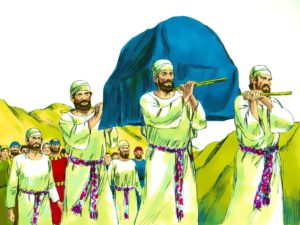 God set aside the tribe of Levi to take care of the tent/temple. These priests belonged to God in a way which was different from all other Hebrews. Only these holy priests (i.e., priests who belonged to God) were permitted to enter the tent/temple. Only these holy priests could bring sacrifices to God.
God set aside the tribe of Levi to take care of the tent/temple. These priests belonged to God in a way which was different from all other Hebrews. Only these holy priests (i.e., priests who belonged to God) were permitted to enter the tent/temple. Only these holy priests could bring sacrifices to God.
Although they did not realize it, these priests were actually pictures of Jesus Christ, who as a human was truly holy and perfect enough to enter into God’s very presence and as God could cleanse away the sins of all the people who ever lived. God designed his tent/temple and priests as preparations for the coming of Jesus Christ.
God commanded the Hebrews to make a tent/temple
God commanded the Hebrews to sacrifice animals for sin
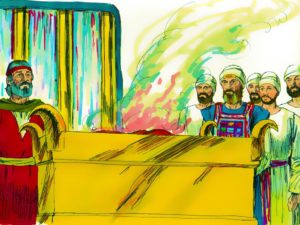 God designed the tent/temple to teach all people about their sinfulness and their need for deliverance from sin. Only the priests were allowed in the tent/temple and only once a year could anyone enter into the Most Holy Place, because God’s PRESENCE dwelt there. These priests had to offer sacrifices to be clean enough to enter the temple. The sacrifices showed 2 truths: first that everyone deserved to die because they were sinful and second that one day God would send Eve’s SEED, Jesus Christ, to die in our place to take away the guilt of our sins.
God designed the tent/temple to teach all people about their sinfulness and their need for deliverance from sin. Only the priests were allowed in the tent/temple and only once a year could anyone enter into the Most Holy Place, because God’s PRESENCE dwelt there. These priests had to offer sacrifices to be clean enough to enter the temple. The sacrifices showed 2 truths: first that everyone deserved to die because they were sinful and second that one day God would send Eve’s SEED, Jesus Christ, to die in our place to take away the guilt of our sins.
5 Books of Moses
Exodus
Moses wrote Exodus sometime during the Hebrews stay in the wilderness. Exodus was very much a “remembering book”. God said, “Now I have heard the groaning of the Israelites, whom the Egyptians have enslaved, and I have remembered my covenant.” (Exodus 6:5) But God also wanted the Hebrews to remember: “Remember this day—the day on which you left Egypt, the place where you were slaves. This is the day the LORD brought you out by his great power. No leavened bread is to be eaten. You are leaving Egypt on this day in the first month, the month of Abib.”
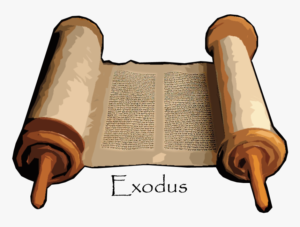 Who wrote Exodus?
Who wrote Exodus?
Moses, brother of Miriam and Aaron.
When did Moses write Exodus?
Moses wrote Exodus during the Hebrews’ journeys in the wilderness. This was at least a year AFTER their rescue from slavery in Egypt and possibly BEFORE they refused to enter the promised land of Canaan the first time.
Who were the original readers of Exodus?
2.5 Million Hebrews, who had been slaves in Egypt for centuries. God had rescued them and brought them out of their slavery through mighty miracles. They were now in the wilderness, led by Moses and needed to understand many truths about God and themselves.
What led Moses to write Exodus?
Exodus was certainly written to help the Hebrews remember how God had miraculously rescued them from slavery in Egypt. Also, in Exodus, Moses wrote down God’s first Law, which included the 10 Commandments. Moses included a description of Israel’s first act of rebellion in fashioning and worshiping an idol and shows both God’s anger and His gracious forgiveness. Finally, Moses wrote down in Exodus God’s detailed instructions for building of the tent/temple.
What did Moses want to change in his original readers?
Moses wanted the Hebrews to trust God and keep God’s Law, which was their part of their covenant contract with God. Maybe the best way to help them stay faithful was to remind them of how God had miraculously saved them in Egypt and how He faithfully protected them and provided for them at every step along the way. Moses also wanted to write down God’s exact instructions for the building of the tent-temple.
5 Books of Moses
Leviticus
Probably God had already spoke most of Leviticus to Moses before the Hebrews had finished sewing and building the tent/temple which would be Yahweh’s “home” for several centuries. It was impossible for God’s PRESENCE to be with the Hebrews because they were like everyone else on earth–constantly sinning against God. We know that no one could look on the PRESENCE of God and live and that was even true of the high priest! Even so, God had decided that His PRESENCE would dwell with them, hidden in a room in the tent/temple. God spoke all of Leviticus to give the rules which must be followed by the Hebrews if God’s PRESENCE were to stay with them.
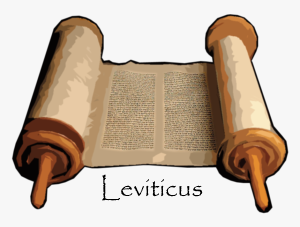 Who wrote Leviticus? Moses, brother of Miriam and Aaron.
Who wrote Leviticus? Moses, brother of Miriam and Aaron.
When did Moses write Leviticus? Moses wrote Leviticus during the Hebrews’ journeys in the wilderness. This was at least a year AFTER their rescue from slavery in Egypt and probably BEFORE they refused to enter the promised land of Canaan the first time.
Who were the original readers of Leviticus? 2.5 Million Hebrews, who had been slaves in Egypt for centuries. These people apparently knew little about their ancestors (explained in Genesis) and knew little about Yahweh, who had rescued them from Egypt. Probably, they copied what the Egyptians did in their religion and maybe even also copied religious practices and beliefs from others who might have been living in Egypt. We know they worshiped idols.
What led Moses to write Leviticus? All through Leviticus, it says, “The Lord spoke to Moses (and sometimes to Aaron too) saying…” God is giving Israel the heart of their religious life, especially helping them to understand what was clean and unclean and what it meant that God is holy. God was establishing religious and social practices which would show the seriousness of sin (it makes humans unclean and worthy to enter God’s presence and could only be removed through sacrifice). Many of the rules we find in Leviticus show how everything a human does is unclean and separates humans from God. The rules in Leviticus were filled with symbolism, much of it preparing the way for the coming of Jesus Christ, who would be priest, temple, presence of God and final sacrifice for sin.
What did Moses want to change in his original readers? God wanted His people to realize how sinful they were and how everything they did was poisoned by their own personal sinfulness. But God also wanted the Hebrews to realize that there was a way to be set free from sin, which was symbolized in the sacrifices, but actually was preparing all humanity for God’s Son to die to pay for all human sin.
The Hebrews made a tent/temple for His PRESENCE
God commanded the Hebrews to conquer the LAND, but they refused
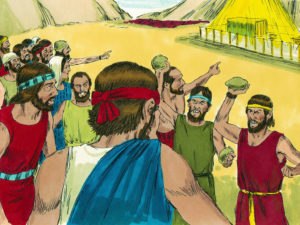 A little more than a year after they had left Egypt, the Hebrews camped near the borders of the LAND promised to Abraham. After hearing reports about the walled cities, the chariots and powerful Canaanite armies, the people decided to go back to Egypt rather than face doing battle with the Canaanites. Moses, Joshua and Caleb begged the people to trust God and invade the land, but the people refused. They said, “Why is the LORD taking us into that land? We will be killed in battle, and our wives and children will be captured. Wouldn’t it be better to go back to Egypt?”
A little more than a year after they had left Egypt, the Hebrews camped near the borders of the LAND promised to Abraham. After hearing reports about the walled cities, the chariots and powerful Canaanite armies, the people decided to go back to Egypt rather than face doing battle with the Canaanites. Moses, Joshua and Caleb begged the people to trust God and invade the land, but the people refused. They said, “Why is the LORD taking us into that land? We will be killed in battle, and our wives and children will be captured. Wouldn’t it be better to go back to Egypt?”
Therefore, God chose to judge those people by keeping them from returning to Egypt OR invading the LAND of Canaan. The Hebrews ended up waiting in the wilderness for 39 more years before they finally entered Canaan.
5 Books of Moses
Numbers
Numbers is the hidden jewel of the Bible. It starts off by telling us names and numbers and then some important laws God gave to Israel after different difficulties had happened. Really, the exciting part of the book does not start until chapter 11. Chapters 11-17 help us understand WHY the Hebrews ended up living for 40 years in the wilderness. We learn about how hard it was for Moses to lead the people. The next chapters give more laws for worship and Israel’s religious and social life. The rest of the book has some amazing stories (including why Moses was not allowed to enter the Promised Land) plus laws which helped prepare the Hebrews for living in the Promised Land.
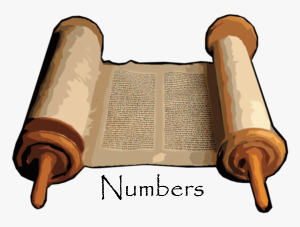 Who wrote Numbers? Moses, brother of Miriam and Aaron.
Who wrote Numbers? Moses, brother of Miriam and Aaron.
When did Moses write Numbers? Moses wrote Numbers almost at the end of the Hebrews’ 40 year time in the wilderness. This AFTER Moses sin and Aaron’s and Miriam’s deaths and BEFORE Moses’ final sermon to the Hebrews as they waited to enter the promised LAND of Canaan.
Who were the original readers of Numbers? The younger generations of Hebrews, who had either been children in Egypt or were born during Israel’s 40-year stay in the wilderness. All of them had been raised knowing Genesis, Exodus and Leviticus and knew much about Yahweh, who had rescued them from Egypt. Many of them had only known the religious practices commanded in the Exodus and Leviticus.
What led Moses to write Numbers? God commanded Moses to count all of the men who were old enough to fight in battle, so much of Numbers gives us the result of that count. God also revealed important Laws about lots of different issues. Probably, however, Numbers is especially important for the Hebrews to understand how deadly disobedience can be.
What did Moses want to change in his original readers? The Hebrews were just about to finish their time in the wilderness and to invade the promised LAND of Canaan. They needed to trust God now more than ever, to face their enemies without fear. They could strengthen their faith by carefully studying the stories and laws in Numbers.
God led the Hebrews into the LAND and gave them a Mission
God led the Hebrews into the LAND and gave them a Mission
The first generation passed & only the newer generations entered Canaan
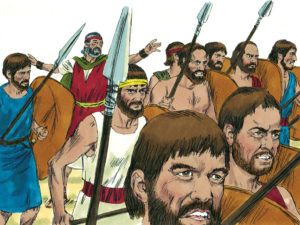 Although from the very beginning God had promised to bring the Hebrews to Canaan, the LAND promised to Abraham, they did not enter until 40 years passed. During these 40 years, all of the older generation died off (except for 2 families) and a younger generation was now ready to enter the land. Not even Moses and Aaron could enter the land; they had sinned against God.
Although from the very beginning God had promised to bring the Hebrews to Canaan, the LAND promised to Abraham, they did not enter until 40 years passed. During these 40 years, all of the older generation died off (except for 2 families) and a younger generation was now ready to enter the land. Not even Moses and Aaron could enter the land; they had sinned against God.
Of course, God’s Great Salvation Story is not about heroes anyway; it is about how the SEED promised to Eve passed from generation to generation. Now the SEED was returning to the promised LAND.
God led the Hebrews into the LAND and gave them a Mission
The Hebrews’ Mission: Destroy all of the people in the LAND of Canaan
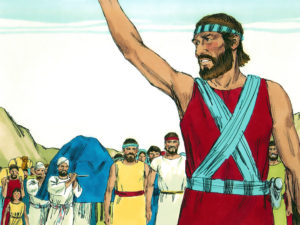 Their Mission: Invade the land of Canaan and conquer each village, town and city. God had long ago decided to punish the people living there and He was using the Hebrews to carry out His justice.
Their Mission: Invade the land of Canaan and conquer each village, town and city. God had long ago decided to punish the people living there and He was using the Hebrews to carry out His justice.
If the Hebrews lived according to God’s Law and fought their battles according to God’s instructions, they would always win those battles.
Since God was punishing the people who lived in Canaan, He commanded the Hebrews to kill every single person in every city, town and village. The only enemy who could defeat Israel was their own sin. And so, they crossed the Jordan River and began their mission of conquering the land, city by city, village by village.
God led the Hebrews into the LAND and gave them a Mission
The Law of Moses was God’s contract for staying in the Land
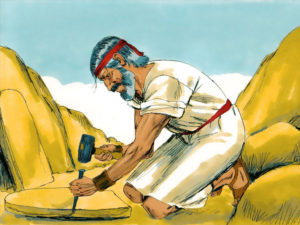 God saved Israel so they could live in the LAND promised to Abraham. The LAND was where Israel could receive God’s BLESSING and be near His PRESENCE.
God saved Israel so they could live in the LAND promised to Abraham. The LAND was where Israel could receive God’s BLESSING and be near His PRESENCE.
But Israel could only stay in the LAND if they obeyed God. Therefore, God gave them Laws to obey.
The Laws covered every kind of thing. There were some laws about clothing, food, relationships and many other parts of life. If the Hebrews wished to stay in the LAND, then every part of their lives needed to belong to God.
The Law was NOT about how to receive eternal life; that could only come by faith in God’s promise of the Messiah. But the Law was a part of God’s agreement with the Hebrews; if they obeyed the Law they could stay in the LAND and find blessing in the LAND.
5 Books of Moses
Deuteronomy
Deuteronomy is Moses’ goodbye message to the people he had loved for 40 long years. Although Moses could not enter the promised LAND (see Numbers), he wanted to make sure the Hebrews did things right this time. In Deuteronomy, Moses retold the story of the Hebrews deliverance and time in the wilderness, all of which was described in Exodus, Leviticus and Numbers. Moses also reminded them of key laws, such as the 10 commandments. If you are looking for the Shema, you’ll find it here in Deuteronomy.
In many ways, Deuteronomy is so spiritually deep, filled with spiritual truth that you could study it the rest of your life and still find more precious jewels here.
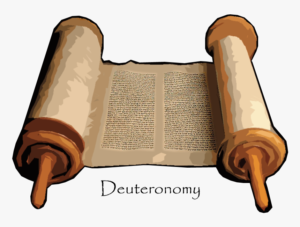 Who wrote Deuteronomy? Moses, brother of Miriam and Aaron.
Who wrote Deuteronomy? Moses, brother of Miriam and Aaron.
When did Moses write Deuteronomy ? Moses wrote Deuteronomy at the end of the Hebrews’ 40 year time in the wilderness. This was AFTER Moses’s sin and Aaron’s and Miriam’s deaths and BEFORE Joshua led them across the Jordan River into the promised LAND of Canaan.
Who were the original readers of Deuteronomy ? The younger generations of Hebrews, who had either been children in Egypt or were born during Israel’s 40-year stay in the wilderness. All of them had been raised knowing Genesis, Exodus and Leviticus and knew much about Yahweh, who had rescued them from Egypt. Many of them had only known the religious practices commanded in the Exodus and Leviticus. They were about to enter into battle in Canaan.
What led Moses to write Deuteronomy? Moses knew the Hebrews were about to face 2 really big challenges: first, they were going to battle armies of Canaan and second, they were going to be tempted to relax and copy the religion of the people of Canaan. Plus, Moses also want to write to future generations, so they could understand why Israel failed to continue to obey God.
What did Moses want to change in his original readers? The Hebrews were just about to finish their time in the wilderness and to invade the promised LAND of Canaan. They needed to trust God now more than ever, to face their enemies without fear. They could strengthen their faith by remember how God had faithfully led them for 40 years, starting with the miracle of the Exodus. They could face any battle with courage because God was with them. But they MUST be careful not to fall into idolatry. He wanted future generations as well to read Deuteronomy to understand why Israel had failed to trust God (they had not cleansed the land of all the Canaanites).
The Hebrews failed to fulfill their mission & became idol worshipers
The Hebrews crossed into the Promised LAND and began conquering city by city
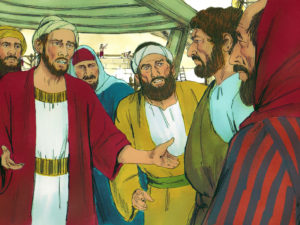 After 40 years in the wilderness, the Hebrews finally crossed the Jordan River and began conquering the LAND.
After 40 years in the wilderness, the Hebrews finally crossed the Jordan River and began conquering the LAND.
Joshua, Moses’ assistant, faithfully led the Hebrews in battle after battle. Slowly, the Hebrews began taking the cities, towns and villages for Israel.
God’s revealed plan was for them slowly to conquer cities, towns and villages, taking much more than just a year or two. As they conquered these areas, they would occupy the land. Each tribe was given their own area, something like a state or province.
The Hebrews failed to fulfill their mission & became idol worshipers
The Hebrews failed to fulfill their mission & became idol worshipers
Joshua died and as time went on, that generation also died
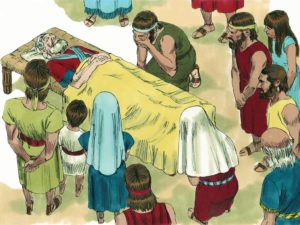 Joshua was an excellent general and leader. However, even by the end of his life, all of Canaan was not yet conquered. God’s revealed Mission for the Hebrews was to conquer everything and either to kill all the people already there; this was God’s plan for judging the Canaanites.
Joshua was an excellent general and leader. However, even by the end of his life, all of Canaan was not yet conquered. God’s revealed Mission for the Hebrews was to conquer everything and either to kill all the people already there; this was God’s plan for judging the Canaanites.
“ After that, the Lord’s servant Joshua son of Nun died at the age of 110. 30 They buried him on his own land at Timnath Serah in the hill country of Ephraim north of Mount Gaash. 31 As long as Joshua lived, the people of Israel served the Lord, and after his death they continued to do so as long as those leaders were alive who had seen for themselves everything that the Lord had done for Israel.” (Joshua 24:29–31)
History Books
Joshua
Joshua tells the story of the Hebrews’ attack and conquest of the promised LAND of Canaan. It is straight history with some helpful comments along the way to keep the reader aware of faith and courage and mistakes. It was probably written sometime after Joshua died or at least finished later, but it is very possible that Joshua himself wrote much of it and someone else simply finished it.
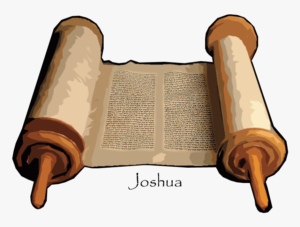 Who wrote Joshua?
Who wrote Joshua?
It does not say, but almost certainly it was written by Joshua himself. There are a couple of clues to this. First, Rahab the prostitute was still alive when the book of Joshua was written [“But Rahab the prostitute and her father’s household and all who belonged to her, Joshua saved alive. And she has lived in Israel to this day, because she hid the messengers whom Joshua sent to spy out Jericho” (Joshua 6:25, ESV)]. Also, we read this in Joshua 24: “That day Joshua drew up an agreement for the people, and he established rules and regulations for them in Shechem. Joshua wrote these words in the Law Scroll of God.” (Joshua 24:25–26). So, it sounds like Joshua wrote all but the verses about his death.
When did the author write Joshua?
Joshua wrote this during his lifetime, as the Hebrews were fighting constant battles to destroy the inhabitants of the land and to cleanse the land of the presence of these peoples.
Who were the original readers of Joshua?
They were Hebrews, who were of Joshua’s generation and the generation that followed. We can guess that they knew the 5 Books of Moses well. Perhaps they were the generation that had stopped conquering, and Joshua wrote to inspire them to start fighting again.
What led the author to write Joshua?
Perhaps they were the generation that had stopped conquering the cities and towns in the promised land of Canaan, and Joshua wrote (and the final prophetic editor wrote) to inspire them to start fighting again.
What did this anonymous prophet want to change in his original readers?
The author wrote to inspire the next generations to finish the job of conquering all the villages, towns, and cities in Canaan, imitating the faithfulness and courage of Joshua and his generation.
After Joshua, the period of the Judges with many worshiping idols
During the time of the Judges, Hebrews soon copied their Canaanite neighbors’ idol worship
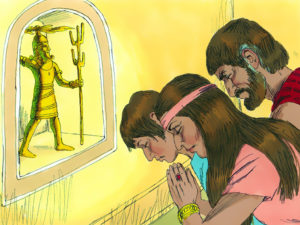 Once Joshua’s generation died off, the Hebrews stopped trying to carry out God’s plan of judging the Canaanites. The Hebrews made peace with the Canaanites who were still left. Their decision to ignore God’s mission had terrible results, however.
Once Joshua’s generation died off, the Hebrews stopped trying to carry out God’s plan of judging the Canaanites. The Hebrews made peace with the Canaanites who were still left. Their decision to ignore God’s mission had terrible results, however.
It did not take long for the Canaanites to begin encouraging the Hebrews to worship other gods. The Hebrew wanted gods they could see and touch and carry with them. Yahweh was present with them in the tent/temple, but serving Canaanite gods was easier than serving Yahweh, who called on the Hebrews to love Him and love their neighbors.
They also wanted gods who approved of sexual sin. In fact, the Canaanite religions were terribly immoral and led the Hebrew people far from God. They even sacrificed their own children to their false gods so that the gods would send rain for the crops or victory in battle. The Hebrews started doing this too.
Following these false gods made God angry at the Hebrews and He decided to punish them.
The Hebrews failed to fulfill their mission & became idol worshipers
To punish the Hebrews’ sin, God sent enemies & troubles
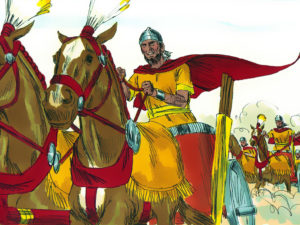 God had made a covenant-contract with the Hebrews; If they would obey His Law then He would bless them in the LAND. If, on the other hand, the people worshiped other gods, then God would punish them with curses.
God had made a covenant-contract with the Hebrews; If they would obey His Law then He would bless them in the LAND. If, on the other hand, the people worshiped other gods, then God would punish them with curses.
Once Joshua was gone and the people followed their Canaanite neighbors in worshiping idols, God began bringing enemies to the land to punish them. Then the people would ask God to deliver them and He would then send a warrior (called a judge) to defeat their enemies. Then after a while, they would go right back into idolatry. This became a pattern for the Hebrews: Blessing, sin, punishment, deliverance, blessing.
History Books
Judges
Judges must have been a sad and painful book to write, because it tells a sad and painful story without hiding anything. The key to reading Judges is this sentence, which shows up 4 times: “And the children of Israel did evil in the sight of the Lord” (“Israel” is the other name for “Jacob”: The Hebrews are the children [descendants] of Jacob).
If you want to know why Israel failed as a nation, the answer is clear: they worshiped Canaanite idols because the Hebrew armies stopped conquering the Canaanites. Judges has heroes, but even most of them were pretty corrupted by sin and bad teaching.
Who wrote Judges? This is another anonymous prophet who wrote this book. It certainly could have been Samuel, but it simply does not say.
When did the author write Judges? The Book of Judges has a clue that it was written when King Saul ruled Israel but before King David conquered Jerusalem. First, the prophet wrote, “Now it came about in those days, when there was no king in Israel…”, which makes it sound as if there was a king ruling when he wrote that. Yet, the prophet also wrote, “But the sons of Benjamin did not drive out the Jebusites who lived in Jerusalem; so the Jebusites have lived with the sons of Benjamin in Jerusalem to this day.” (Judges 1:21) Since David conquered the Jebusites at the beginning of his kingship, this book was almost certainly written during the time of King Saul.
Who were the original readers of Judges? Hebrews who may have never lived during the time of the judges, but were living under King Saul, who forbade all idolatry or witchcraft. They probably did not know much about God’s laws and had parents and grandparents who had worshiped idols during the period of the Judges.
What led the author to write Judges? The anonymous prophet who wrote this book wanted the Hebrews to understand how terrible life was when everyone did what was right in their own eyes and did not seek Yahweh’s will, but preferred Canaanite wickedness and idolatry.
What did this anonymous prophet want to change in his original readers? He certainly wanted his readers to turn away from idolatry and to devote themselves to serving Yahweh whole-heartedly in everything they might do.
The Hebrews failed to fulfill their mission & became idol worshipers
The Hebrews asked to be like other nations with kings: King Saul–1st King of Israel
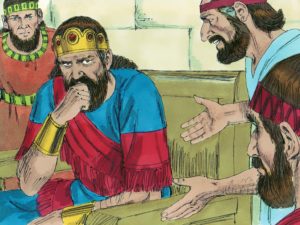 Finally the Hebrews asked God to give them a king, so they could be like the other nations. God warned them that kings cause their people many problems, but the people insisted. So God appointed Saul as the first king of Israel. Saul was from the tribe of Benjamin. He was smart and courageous, but he also worried too much about pleasing the people.
Finally the Hebrews asked God to give them a king, so they could be like the other nations. God warned them that kings cause their people many problems, but the people insisted. So God appointed Saul as the first king of Israel. Saul was from the tribe of Benjamin. He was smart and courageous, but he also worried too much about pleasing the people.
After Saul disobeyed God several different times, God turned to a young man named David as the next king. David was different from all the other leaders. He was a man after God’s own heart. Also, the seed had been passed down from Judah to his son Perez and then down the line to Jesse, David’s father and then to David himself. Now Israel had a king who was also the SEED of Eve!
God made a covenant with David, but he also failed
God made a covenant with David, but he also failed
King David, who bore the SEED of Eve & loved God, made king of all Israel
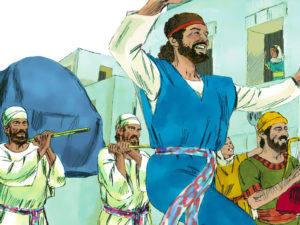 David was bearer of the SEED of Eve and surely some people must have wondered if he would fulfill God’s promise and crush Satan’s head. He was a brilliant king, a wonderful musician, a profound writer of poetry and faithful to God. Now perhaps God would bring the many blessings He had promised.
David was bearer of the SEED of Eve and surely some people must have wondered if he would fulfill God’s promise and crush Satan’s head. He was a brilliant king, a wonderful musician, a profound writer of poetry and faithful to God. Now perhaps God would bring the many blessings He had promised.
God said of David that he was a man after God’s own heart.
King David had a comfortable house for himself, but God’s presence as still dwelling in the tent-temple. King David asked God’s permission to build a permanent temple for God. God said that David could not do this, because he was a man of warfare and God wanted a man of peace to build His house.
Then God made a promise to David; because he was faithful to God, God would guarantee that David’s descendants would rule in Israel forever. The SEED of Eve would forever sit on David’s throne.
History Books
Ruth
This lovely story almost has to be true, because it shows that David’s great grandmother was from Moab. Deuteronomy forbids Hebrews from marrying people from Moab. In other words, some people might judge David as not pure enough in his family.
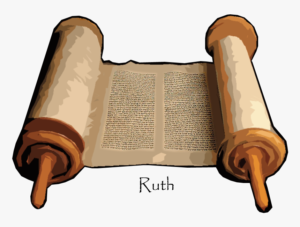 Who wrote Ruth? It does not say,
Who wrote Ruth? It does not say,
When did the author write Ruth? It was certainly written DURING King David rule AFTER David became King (it metions David), but BEFORE Solomon became king (it does not mention Solomon)
Who were the original readers of Ruth? Hebrews living during the days of King David who probably did not have a very good knowledge of the 5 books of Moses but needed to understand why it is important to remain faithful to God.
What led the author to write Ruth? Probably the author wanted to inspire the Hebrews to trust in God even in times of great sorrow and need; God can make even a terrible situation end up well. Also, of course, he wanted them to know the story of how the SEED of Eve passed to David.
What did the author want to change in his original readers? The author wanted his readers to trust in God and to be faithful to doing what is right.
God made a covenant with David, but he also failed
Because of pride, King David committed adultery and murder
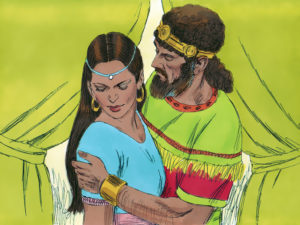 However, David began to think he, as king, was above God’s Law and when he saw a beautiful woman named Bathsheba, he decided he wanted to go to bed with her, even though her husband was one of David’s trusted soldiers. She became pregnant. David, not wanting to be shamed, tried hide his sin from the people. When that didn’t work, David arranged for her husband to die in battle along with several other soldiers.
However, David began to think he, as king, was above God’s Law and when he saw a beautiful woman named Bathsheba, he decided he wanted to go to bed with her, even though her husband was one of David’s trusted soldiers. She became pregnant. David, not wanting to be shamed, tried hide his sin from the people. When that didn’t work, David arranged for her husband to die in battle along with several other soldiers.
Then God sent the prophet Nathan to confront David’s sin. David repented and God forgave him, but this one sin had many bad results.
David bore the SEED of Eve, but he was not the promised Savior.
God made a covenant with David, but he also failed
Absolom’s conspiracy, a result of David’s adultery and murder
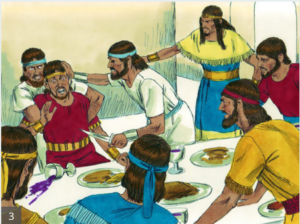 About 5 years before David died, his son Absalom began plotting to take the throne away from his father. Absalom had not been the right person for the throne, for he had murdered his half-brother Amnon, punishing him for raping Absalom’s full sister Tamar (and also, perhaps, removing the oldest son so it would be easier for Absalom to become king).
About 5 years before David died, his son Absalom began plotting to take the throne away from his father. Absalom had not been the right person for the throne, for he had murdered his half-brother Amnon, punishing him for raping Absalom’s full sister Tamar (and also, perhaps, removing the oldest son so it would be easier for Absalom to become king).
Absalom might have succeeded in overthrowing David, but this was not God’s plan. The prophet Nathan, chief general Joab, and the priests sided with David, along with Hushai, a respected counselor. However, most of the army and people followed Absalom.
A great battle came about, however, and Joab’s armies supporting David entirely defeated Absalom’s soldiers. David returned to Jerusalem and ruled, growing weaker and weaker until within a few years, he spent most of his time in bed.
None of these terrible things needed to happen. The Law of Moses clearly declared that David’s son Amnon (who raped his half-sister Tamar) should have been executed. Had this been done, then Absalom would have had not reason to venge himself on his half brother.
In addition, David should have executed Absalom for the murder of Amnon, even if he was the King’s son. Had David obeyed Moses’ law, much pain would have been avoided.
Some of David’s descendants loved God, but many worshiped idols
Solomon built the temple, but ended up worshiping idols
Solomon built the temple as a placed for God’s presence to dwell
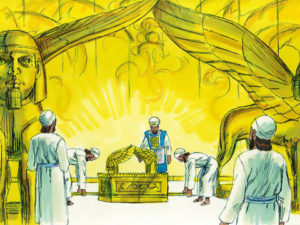 The SEED of Eve passed from Jesse to David, from David to Solomon. Up until this time, God’s presence dwelt in the tent/temple which had originally been sewn and built by Moses’ craftsmen. David had wanted to build a house, but God said that David was a man of warfare and He wanted a man of peace to build it.
The SEED of Eve passed from Jesse to David, from David to Solomon. Up until this time, God’s presence dwelt in the tent/temple which had originally been sewn and built by Moses’ craftsmen. David had wanted to build a house, but God said that David was a man of warfare and He wanted a man of peace to build it.
Therefore, David collected all of the materials needed for a great temple and his son Solomon built that temple in Jerusalem for God’s PRESENCE to indwell. It was a beautiful home and was the pride of every Hebrew.
When they dedicated the temple, God’s PRESENCE came down onto the Temple in great glory.
Some of David’s descendants loved God, but many worshiped idols
Solomon brought Israel to its highest point in wealth and peace
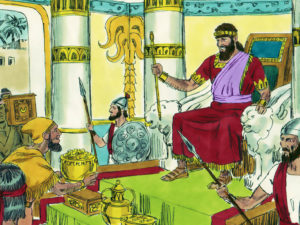 Solomon brought Israel to its highest point culturally and economically. He was famous for great wisdom and spoke many proverbs (wise sayings).
Solomon brought Israel to its highest point culturally and economically. He was famous for great wisdom and spoke many proverbs (wise sayings).
Solomon became amazingly rich and was highly respected by kings and queens.
Wisdom Books
Proverbs
It’s difficult to know exactly where to put the book of Proverbs, because it is several groups of wise sayings which were collected first by Solomon and then by his descendant, King Hezekiah (who lived several hundred years later) and others. We are putting it here during Solomon rule as king, because many of these proverbs come from Solomon.
These proverbs are advice to a young man or woman about how to be successful in general. They are NOT prophecies nor are they Laws nor are they promises; they are advice which probably will improve a person’s life.
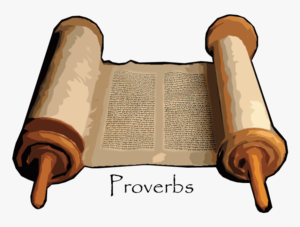 Who wrote Proverbs? Mostly Solomon (including some which were organized by a committee appointed by King Hezekiah many years later), Agur ben Jakeh, Lemuel
Who wrote Proverbs? Mostly Solomon (including some which were organized by a committee appointed by King Hezekiah many years later), Agur ben Jakeh, Lemuel
When did the author write Proverbs? It was certainly written DURING King Solomon’s rule AFTER David died but BEFORE Solomon died.
Who were the original readers of Proverbs? Hebrews living during the days of King Solomon.
What led the author to write Proverbs? Proverbs seems to start with advice to a young man (one of Solomon’s sons) on how to live wisely. The next part is a collection of many wise sayings, probably all first spoken by Solomon. More than anything, one would imagine that Solomon wanted the people who read this book to learn how to be successful in life.
What did the author want to change in his original readers? Solomon did not want his readers to be foolish, but to be successful in all aspects of life.
Wisdom Books
Song of Songs, which is Solomon’s
The Song of Songs differs from every other book of the Bible. It is not about God, the Law, the LAND, prophecy or even wisdom. It is simply a love song and is at points quite open in what it says.
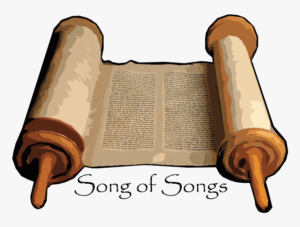 Who wrote the Song of Songs? Solomon
Who wrote the Song of Songs? Solomon
When did the author write Song of Songs? It was certainly written DURING King Solomon’s rule AFTER David died but BEFORE Solomon died.
Who were the original readers of Song of Songs? Hebrews living during the days of King Solomon.
What led the author to write Song of Songs? To openly discuss the beauty of romantic love within marriage.
What did the author want to change in his original readers? Perhaps Solomon wrote it to encourage Hebrews to enjoy an intimate romantic relationship with their spouses.
Some of David’s descendants loved God, but many worshiped idols
Because he became an idol worshiper, Solomon died in bitterness
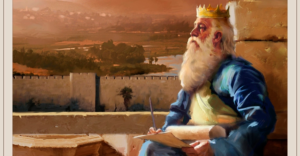 Solomon was very rich and famous for his wisdom, but he was NOT the SEED of Eve promised to save all humans from Satan. Because he had many foreign wives (this was forbidden by God’s Law), Solomon ended up worshiping his wives’ idols.
Solomon was very rich and famous for his wisdom, but he was NOT the SEED of Eve promised to save all humans from Satan. Because he had many foreign wives (this was forbidden by God’s Law), Solomon ended up worshiping his wives’ idols.
His life had begun with so much hope and promise, but he ended in bitterness and despair.
Wisdom Books
Ecclesiastes
 Although the author of Ecclesiastes did not say, “I, Solomon wrote this book”, there are so many clues suggesting that Solomon did write it. But this Solomon was not Solomon as a young man, but as an old man whose life had turned bad and useless. Solomon starts off by saying, “Vapor, vapor! All is vapor!” No matter how good something might seem or how pleasurable or worthwhile, everything is vapor which is here for a moment and then vanishes.
Although the author of Ecclesiastes did not say, “I, Solomon wrote this book”, there are so many clues suggesting that Solomon did write it. But this Solomon was not Solomon as a young man, but as an old man whose life had turned bad and useless. Solomon starts off by saying, “Vapor, vapor! All is vapor!” No matter how good something might seem or how pleasurable or worthwhile, everything is vapor which is here for a moment and then vanishes.
Although Ecclesiastes realizes that we must fear the Lord, most of it sounds like someone who had tried to experiment with everything–humor, food, wine, women, creativity, wisdom, success. In the end, nothing lasted, nothing satisfied, not help. It was all like vapor.
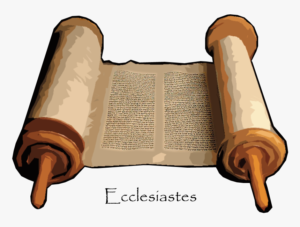 Who wrote Ecclesiastes? King Solomon, son of David
Who wrote Ecclesiastes? King Solomon, son of David
When did the author write Ecclesiastes?
It was certainly written DURING the last days of King Solomon’s rule AFTER David died but right before BEFORE Solomon died.
Who were the original readers of Ecclesiastes?
The original readers were Hebrews living during the days of King Solomon.
What led the author to write Ecclesiastes?
Solomon had lived life in disobedience to Moses’ commands for future kings, with far too many wives, far too much wealth and far too much pleasure. Ecclesiastes says all of this is vapor, blown away by the wind.
What did the author want to change in his original readers?
To warn people to fear God rather than seek to get all of the pleasure one can get.
Some of David’s descendants loved God, but many worshiped idols
The foolish acts of Solomon’s son Rehoboam split the promised LAND into 2 kingdoms
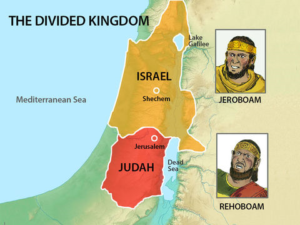 Solomon did so much building during his rule and many people found the burden of taxes and service too much. When Solomon’s son, Rehoboam, became king, the people asked him to lighten their load, but Rehoboam promised to make their work and taxes even worse!
Solomon did so much building during his rule and many people found the burden of taxes and service too much. When Solomon’s son, Rehoboam, became king, the people asked him to lighten their load, but Rehoboam promised to make their work and taxes even worse!
Jeroboam, Solomon’s gifted administrator, led 10 of the 12 tribes of Israel (each tribe came from one of Jacob’s 12 sons) to form their own new nation, which they called Israel. Their capital city was Samaria. The tribes of Judah and Benjamin called their nation Judah. With 1 exception, every king in Judah descended from David; no king of Israel (the northern kingdom) came from David.
God made a covenant with David
The kings of the northern kingdom were idol worshipers from the beginning
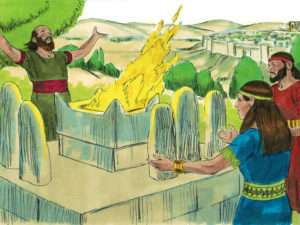 The kings in the northern kingdom (capital of Samaria) never tried to obey God’s Law. They immediately started worshiping idols, because they were afraid if they allowed their citizens to follow Yahweh and the Laws of Moses, the citizens would want to join back with Judah.
The kings in the northern kingdom (capital of Samaria) never tried to obey God’s Law. They immediately started worshiping idols, because they were afraid if they allowed their citizens to follow Yahweh and the Laws of Moses, the citizens would want to join back with Judah.
For ALL of their history, the northern kingdom worshiped idols. They even offered their own sons and daughters to be burned alive as offerings to their false God.
God made a covenant with David
The Northern Kingdom was defeated & carried away by Assyria
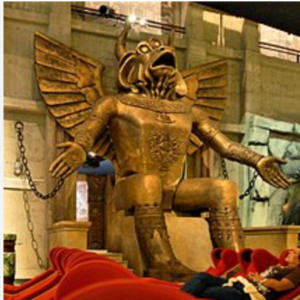 The Northern Kingdom had 19 different kings. Whereas the Southern Kingdom of Judah always had a descendant of David ruling (except for Queen Athaliah), the Northern Kingdom NEVER had this. In fact, 9 different times a rebel killed the current king and that rebel set himself in that king’s place.
The Northern Kingdom had 19 different kings. Whereas the Southern Kingdom of Judah always had a descendant of David ruling (except for Queen Athaliah), the Northern Kingdom NEVER had this. In fact, 9 different times a rebel killed the current king and that rebel set himself in that king’s place.
We know about 5 men who served as God’s prophets to the Northern Kingdom: Elijah, Elisha, Hosea, Amos, and Jonah. There were certainly others who called themselves prophets of Yahweh. Perhaps some of them were real prophets of Yahweh, but most of those so-called prophets also served other gods.
The kings rarely listened to God’s authentic prophets and executed many of them. 1 Kings 18:3-4 tells us, “So Ahab summoned Obadiah, who supervised the palace. (Now Obadiah was a very loyal follower of the LORD. When Jezebel was killing the LORD’s prophets, Obadiah took one hundred prophets and hid them in two caves in two groups of fifty. He also brought them food and water.)” (1 Kings 18:2–4) It’s amazing that the 5 prophets we know about survived at all!
The 6th king, Omri, bought the hill of Samaria to be his capital city for his kingdom. Once Omri set up Samaria, this became a center for government as well as idol-worship. Often the prophets talk about Samaria but they really mean the whole northern kingdom. The
Amos warned them that judgment was coming. “Look, the eyes of the Lord GOD are on the sinful kingdom, and I will destroy it from the face of the earth. However, I will not totally destroy the house of Jacob — this is the LORD’s declaration—” (Amos 9:8)
Hosea also warned about God’s judgement: “The day of punishment is coming, and Israel will be ruined. People of Israel, this will surely happen!” (Hosea 5:9)
And it happened just as predicted. In the ninth year of King Hoshea’s rule, the king of Assyria (Shalmaneser) invaded the northern kingdom of Israel. After a 3-year siege, Samaria fell to Shalmaneser’s army.
Minor Prophets
Jonah
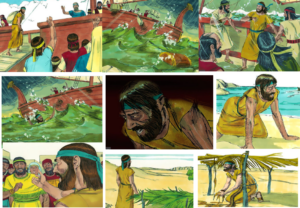 Historians rarely see the story of Jonah as history. They find it hard to believe that a man would take 3 days to make his way through the ancient city of Nineveh on foot, even though it would take that long if the man were preaching in every neighborhood along the way.
Historians rarely see the story of Jonah as history. They find it hard to believe that a man would take 3 days to make his way through the ancient city of Nineveh on foot, even though it would take that long if the man were preaching in every neighborhood along the way.
Historians also find it hard to believe that the people would have repented at Jonah’s preaching. Assyria was a great nation and Israel was a tiny kingdom with an unknown God, Yahweh. They are certainly right about this–it is hard to believe that ANYONE might repent from sin and turn to God; this can only happen through a miracle! But we certainly know that such miracles do happen.
Of course, the main reason that historian reject the book of Jonah is the fish. They argue that no one could survive for 3 days in the belly of a fish. This ignores the most obvious answer; God appointed a fish. If God can create the oceans and populate them with fish by a single word, why would we doubt that God could create a fish with a single word and send it to wait beside Noah’s boat.
Is it all a myth? Jesus certainly did not see it as a myth. “But He answered and said to them, ‘An evil and adulterous generation craves for a sign; and yet no sign will be given to it but the sign of Jonah the prophet; for just as JONAH WAS THREE DAYS AND THREE NIGHTS IN THE BELLY OF THE SEA MONSTER, so will the Son of Man be three days and three nights in the heart of the earth. The men of Nineveh will stand up with this generation at the judgment, and will condemn it because they repented at the preaching of Jonah; and behold, something greater than Jonah is here.’” (Matthew 12:39–41)
Only through severe twisting of Jesus’ words can we say that Jonah was not in the belly of the fish. AND only with severe twisting of Jesus’ words can we say that the men of Nineveh did not repent at Jonah’s preaching. These very men who repented will be there on the day of judgement, suggesting that they MUST be real!
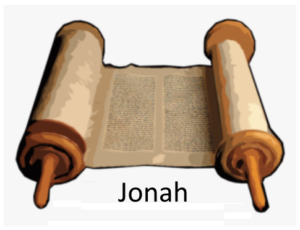 Who wrote Jonah? This book was most likely written by Jonah himself, a prophet of the Northern Kingdom. We see one mention of Jonah in
Who wrote Jonah? This book was most likely written by Jonah himself, a prophet of the Northern Kingdom. We see one mention of Jonah in
Where does this book fit into God’s great salvation story? Jonah wrote long AFTER Kings David and Solomon and certainly must have finished his ministry about 80 years before the Assyria (i.e., the nation of Nineveh, where God sent Jonah) would defeat the Northern Kingdom and carry them away into exile.
Who were the original readers of Jonah? Our only guess is that Jonah wrote this book for the people of Israel, the northern kingdom. .
What led the author to write Jonah? Jonah knew that the armies of Assyria, whose capital Nineveh, was going to defeat the Northern Kingdom of Israel and carry them away into exile. Amazingly, God sent Jonah 80 years before this happened to preach repentance and deliverance to the people of Israel’s greatest enemy. Jonah wished this book to transform the hearts of the Hebrews to have compassion on those nations who did not know Yahweh.
What did the author want to change in his original readers? Jonah clearly wanted the people of Israel (and probably Judah as well) to pray for the salvation of the people of Nineveh. Within 180 years, the city would be destroyed by the Chaldeans, but Jonah’s book calls the readers to care about the fate of even their most hated enemies.
Minor Prophets
Amos
Amos was a herder of sheep and someone who took care of fig trees. His home town was near Bethlehem, which was in Judah. Amazingly, God appointed this humble man to travel to the northern kingdom of Israel to confront Israel’s king, Jereboam II. This king was not the original Jeroboam and not even from the original Jeroboam’s family, but he was the most successful of Israel’s kings and very powerful.
Amos was astonishingly courageous. Remember, every single king of the northern kingdom worshiped idols. Not one king was in anyway obedient to God and His Words. Yet Amos had the courage to speak directly to these idol worshiping people. “Then Amaziah, the priest of Bethel, sent a message to Jeroboam, king of Israel: “Amos is hatching a plot against you right here on your very doorstep! What he is saying is intolerable. 11 He is saying, ‘Jeroboam will soon be killed, and the people of Israel will be sent away into exile.’ ” 12 Then Amaziah sent orders to Amos: “Get out of here, you prophet! Go on back to the land of Judah, and earn your living by prophesying there! 13 Don’t bother us with your prophecies here in Bethel. This is the king’s sanctuary and the national place of worship!” 14 But Amos replied, “I’m not a professional prophet, and I was never trained to be one. I’m just a shepherd, and I take care of sycamore-fig trees. 15 But the LORD called me away from my flock and told me, ‘Go and prophesy to my people in Israel.’” (Amos 7:10–15)
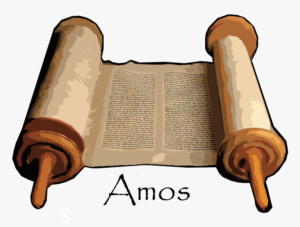 Who wrote Amos? Amos was a shepherd and fig tree farmer from the Southern Kingdom of Judah. God sent him to the Northern Kingdom of Israel to call the people to repent and obey God’s Law.
Who wrote Amos? Amos was a shepherd and fig tree farmer from the Southern Kingdom of Judah. God sent him to the Northern Kingdom of Israel to call the people to repent and obey God’s Law.
Where does this book fit into God’s great salvation story? Amos wrote long AFTER Kings David and Solomon and probably finished his ministry about 70 years before the Northern Kingdom was defeated by another nation and taken away into exile.
Who were the original readers of Amos? Apparently, Amos spoke to the Hebrews at Bethel, a sacred site for the Hebrews idolators in Israel, a place where they worshiped many gods. These people were completely committed to worshiping idols. They were also oppressing the poor and cheating those who could not defend themselves. The king led the nation of idolatry. These people were not interested in repenting from their sins.
What led the author to write Amos? Amos’ prophesied that disaster was coming to Israel and they would not be able to escape it. God was judging them for their love of pleasure, their oppression of the poor and their terrible idolatry. He urged the people to turn away from their sins and return to the Lord.
What did the author want to change in his original readers? Amos wanted the people of Israel to turn away from their sins. Amos warned them, “Go to the LORD, and you will live. If you do not go, he will sweep down like fire on the people of Israel. The fire will burn up the people of Bethel, and no one will be able to put it out.” (Amos 5:6)
Minor Prophets
Hosea
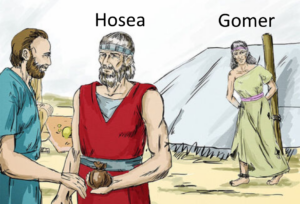 Hosea is a prophecy, but it is also a story of a prophet, Hosea and God’s call for him to marry a woman who would prove unfaithful to him. Hosea’s wife was named Gomer and although Hosea was the true father of their first child, the next 2 children had different fathers.
Hosea is a prophecy, but it is also a story of a prophet, Hosea and God’s call for him to marry a woman who would prove unfaithful to him. Hosea’s wife was named Gomer and although Hosea was the true father of their first child, the next 2 children had different fathers.
God allowed this horrible situation to happen because He wanted Israel (the Northern Kingdom) to understand what they had been doing to their Creator and Lord. Even though they received many blessings from God, the entire northern kingdom worshiped idols (remember, Judah was the southern Kingdom ruled by a descendant of David, but the northern kingdom was ruled by idol-worshiping kings who were NOT from David). The people of the Northern Kingdom were just like Gomer, living in sin even though they claimed to belong to God.
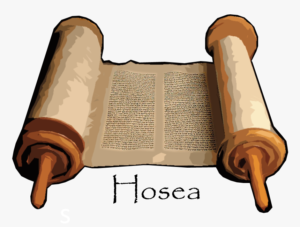 Who wrote Hosea? The Prophet Hosea apparently lived in the Northern Kingdom of Israel. He married a woman who committed adultery against him and gave birth to children whose fathers were not Hosea. He confronted the Northern Kingdom about their spiritual adultery of following after other gods yet speaking as if they belonged to the Lord.
Who wrote Hosea? The Prophet Hosea apparently lived in the Northern Kingdom of Israel. He married a woman who committed adultery against him and gave birth to children whose fathers were not Hosea. He confronted the Northern Kingdom about their spiritual adultery of following after other gods yet speaking as if they belonged to the Lord.
Where does this book fit into God’s great salvation story? Hosea wrote long AFTER King Solomon’s foolish son Rehoboam angered the 10 tribes and caused them to break away and form their own nation, the Northern Kingdom of Israel. Hosea wrote for 30 years, so that the last years of his ministry happened right as the Northern Kingdom was defeated by the Assyrian Empire and the people were carried away into exile.
Who were the original readers of Hosea? Hebrews living in the idol-worshiping northern kingdom of Israel. These Hebrews probably worshiped the God of the Bible and at the same time also worshiped Canaanite gods and goddesses. They still considered themselves God’s chosen people, even though they had left the kingdom ruled by David’s descendant.
What led the author to write Hosea? The prophet Hosea wanted people to understand God’s heart, which was filled with grief and sorrow. He wanted them to see that they could not ignore God’s love for them without God’s punishments designed to bring them to repentance. Many people consider Hosea to be one of the most powerful pictures of the heart of God in the Bible.
What did the author want to change in his original readers? Hosea wanted his readers to see themselves as spiritual adulterers and to repent from their sins and turn back to God. He wanted them to realize that God blesses us because we are His precious bride; the many gifts He gives us must not be shared with our adulterous lovers (money, power, idolatry, pride, etc.).
History (Former Prophets)
1st & 2nd Samuel
An unknown prophet wrote the book of Samuel (it was originally 1 book which later on was divided into 2), but it is difficult to know when. We are confident that the author wrote sometime after Solomon’s son King Rehoboam foolishly caused the kingdom to split into 2 (Israel in the North based in Samaria and Judah in the South based in Jerusalem). There are several places where both Kingdoms are mentioned in passing (1 Samuel 27:6; 11:8; 17:52; 2 Samuel 5:5; 11:11; 12:8; 19:42-43; 24:1, 9). That tells us that Samuel was written AFTER the split.
Since the historical books do depend on ancient documents, we can guess that the prophet who wrote the book of Samuel depended on the Prophet Samuel’s own history of the time period, but that is only a guess.
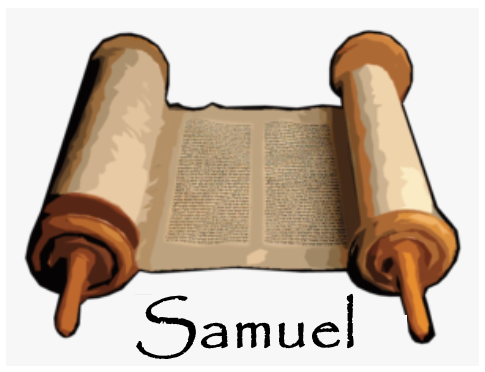 Who wrote 1st & 2nd Samuel? An unknown prophet after the kingdom was split in 2 by Rehoboam.
Who wrote 1st & 2nd Samuel? An unknown prophet after the kingdom was split in 2 by Rehoboam.
Where does this book fit into God’s great salvation story? This unknown prophet wrote the book of Samuel long after the events we read in it (i.e., long after King Saul and King David). It does not mention Assyria conquering Samaria and carrying the people of the Northern Kingdom into exile, so it was probably written before that happened.
Who were the original readers of 1st & 2nd Samuel? We should assume that this book was written for Hebrews living in both Southern Kingdom of Judah and the Northern Kingdom whose capital was in Samaria. Even though we do not know the time, we know that any readers in the Northern Kingdom were surrounded by idol worship, which also happened in the Southern Kingdom as well.
What led the author to write 1st & 2nd Samuel? This book tells how the kingship began, how David became king after Saul died in battle, how God made an unbreakable covenant with David that his descendants would always rule on the throne over Israel forever. The Prophet who wrote this history was building a strong foundation for Israel’s hope that Israel could be reunited as one nation under a descendant of David forever.
What did the author want to change in his original readers? The author wanted his original readers (especially the kings and their counselors and ministers) to copy David in having a heart after God’s heart while being careful to avoid David’s fall into idolatry and murder. He wanted the common people to copy David’s faith (shown especially in the battle with Goliath) and David’s trust in God (shown in many stories as he fled from Saul, who was trying to kill him).
God made a covenant with David
In the Southern Kingdom of Judah, David’s descendants ruled as kings
 Over the next 400 years, about 20 descendants of David ruled on the throne in Judah. There were good kings and bad as well. The promised SEED passed from one generation to the next, from David to Solomon, from Solomon to Rehoboam and on and on.
Over the next 400 years, about 20 descendants of David ruled on the throne in Judah. There were good kings and bad as well. The promised SEED passed from one generation to the next, from David to Solomon, from Solomon to Rehoboam and on and on.
The picture here is of a worship center outside of Jerusalem called a “high place.” God clearly and strongly commanded the Hebrews to destroy all of these high places (worship centers). Most often, the Hebrews were worshiping idols and spirits at these places.
Strangely, even when the kings of Judah were good, they did not destroy the high places (except for 2 kings–Hezekiah and Josiah). In other words, even good kings allowed their people to worship false gods. We should remember that ALL of the kings in the Northern Kingdom of Israel were entirely surrendered to worshiping false gods. It was only in Judah that some good kings still existed.
God made a covenant with David
In the Southern Kingdom of Judah, David’s descendants ruled as kings
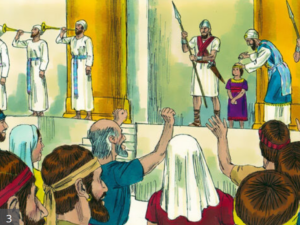 Athaliah was the daughter of the northern King Ahab and his idol worshiping wife Jezebel. Athaliah was married to Jerhoram, King of Judah and an idol worshiper. After 8 years ruling over Judah as king, Jehoram died and his son Ahaziah became king, but he ruled for only 1 year before he was executed while visiting Israel’s king Joram in the north.
Athaliah was the daughter of the northern King Ahab and his idol worshiping wife Jezebel. Athaliah was married to Jerhoram, King of Judah and an idol worshiper. After 8 years ruling over Judah as king, Jehoram died and his son Ahaziah became king, but he ruled for only 1 year before he was executed while visiting Israel’s king Joram in the north.
When Athaliah found out her son, King Ahaziah, was dead, she immediately sent her soldiers to slaughter all of her grandchildren so that no child could take the throne as a descendant of David.
However, Ahaziah’s sister Jehosheba rescued 1 baby, Jehoash, from the nursery just in time before the soldiers began their gruesome task. Jehosheba and the nurse kept the baby safe from the soldier by hiding in the palace room where they stored their mattresses and blankets. They waited until night and then sneaked out and brought the baby to the temple.
For the next 5 years, they raised the boy secretly in the temple, never revealing his presence to anyone. It was not until Jehoash was six years old when Jehoida made the announcement before the people of Jerusalem that Jehoash was indeed the son of Ahaziah and rightful king of Judah.
Although Athaliah called it treason, the people immediately accepted Jehoash as the next king from the line of David. They executed the priest of Baal and Queen Athaliah and placed Jehoash on the throne of David.
Some of David’s descendants loved God, but many worshiped idols
God sent prophets to warn Kings, but the Kings did not listen
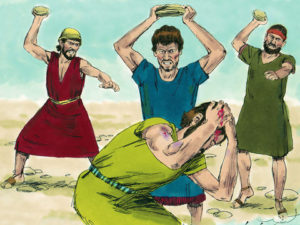 God sent many prophets, like Amos and Hosea and the great prophets Isaiah and Jeremiah. These men loved the people deeply, and sincerely wanted them to turn from their sins and return to serving and obeying God. However, these sinning kings not only did not listen, but they often had these prophets beaten and even put them to death. The Bible says “Manasseh killed so many innocent people that the streets of Jerusalem were flowing with blood; he did this in addition to leading the people of Judah into idolatry, causing them to sin against the LORD.”
God sent many prophets, like Amos and Hosea and the great prophets Isaiah and Jeremiah. These men loved the people deeply, and sincerely wanted them to turn from their sins and return to serving and obeying God. However, these sinning kings not only did not listen, but they often had these prophets beaten and even put them to death. The Bible says “Manasseh killed so many innocent people that the streets of Jerusalem were flowing with blood; he did this in addition to leading the people of Judah into idolatry, causing them to sin against the LORD.”
The books of prophecy we have in our Bibles today were written by these courageous men, who followed God’s command to preach to wicked kings like Manasseh and Ahab and many others.
Minor Prophets
Micah
Micah’s ministry was about the same time as Isaiah’s ministry. “The word of the Lord that came to Micah the Moreshite —what he saw regarding Samaria and Jerusalem in the days of Jotham, Ahaz, and Hezekiah, kings of Judah.” (Micah 1:1)
Jotham was a mostly good king. Ahaz was one of the worst kings of Judah, but Hezekiah was one of the very best.
Micah and Isaiah share an important passage, which is interesting, since they were both ministering during the same time period. It is about that 1000-year period when the Messiah will rule the world. Both Micah and Isaiah write: “and many nations will come and say, “Come, let us go up to the mountain of the Lord, to the house of the God of Jacob. He will teach us about His ways so we may walk in His paths.” For instruction will go out of Zion and the word of the Lord from Jerusalem.” (Micah 4:2)
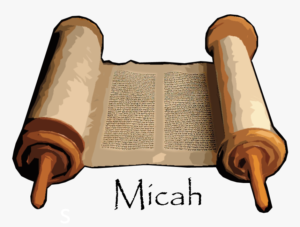 Who wrote Micah? The Prophet Micah seems to have come from a humble family. He did not seem to be interested in the political treaties that Isaiah criticized, but he was much more concerned about justice for the poor and oppress.
Who wrote Micah? The Prophet Micah seems to have come from a humble family. He did not seem to be interested in the political treaties that Isaiah criticized, but he was much more concerned about justice for the poor and oppress.
Where does this book fit into God’s great salvation story? Micah wrote long AFTER Kings David and Solomon and finished his ministry at the beginning of the rule of Manasseh, the worst and most sinful of all of Judah’s kings. Although Micah’s ministry had included preaching to the very good King Hezekiah, Hezekiah’s son King Manasseh persecuted believers. The Bible does not tell us if Micah was still ministering when King Manasseh ruled on the throne.
Who were the original readers of Micah? Micah’s original readers were Hebrews living during the days of King Jotham and King Hezekiah. It seems as if much of the book is trying to help the rich and powerful landowner to treat the poor fairly. But he also gives a whole chapter (6) about the northern kingdom of Israel, which was about to be sent into exile by the armies of Assyria.
What led the author to write Micah? Micah knew that terrible trouble was coming to the northern kingdom of Israel very soon and in the future also to Judah. Micah warned his readers that they had to turn away from cheating and oppressing the poor and powerless. He wrote: “ Mankind, He has told you what is good and what it is the Lord requires of you: to act justly, to love faithfulness, and to walk humbly with your God.” (Micah 6:8) But he also had 2 powerful prophecies about the birth of the coming Messiah and his 100-year rule on the earth.
What did the author want to change in his original readers? Micah wanted the people of Judah to practice justice to the oppressed and obedience to God. He also wanted them to trust in the coming Messiah, the Servant of the Lord, who would be born in Bethlehem and be our peace, ruling the earth as King.
Major Prophets
Isaiah
Many consider Isaiah to be the greatest prophet of the Old Testament. Certainly Isaiah’s prophecies about the coming Messiah are amazing. He predicted that the Messiah would be called Immanuel, that the Messiah would be born a child yet be called “Mighty God”, that the Messiah would die a terrible death at the hands of God’s people and yet bear all of their sins, that the Messiah would rule forever on David’s throne, that God was going to destroy the present heavens and earth and create a New Heavens and a New Earth.
Some of Isaiah is difficult to understand because it deals with other nations, many of which seem strange to us. Even in those passages, however, we can still find many life-changing teachings about God and His ways.
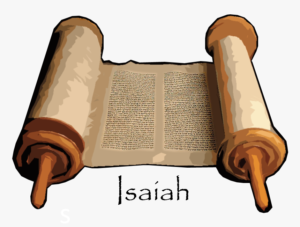 Who wrote Isaiah? The Prophet Isaiah was apparently allowed to speak to the kings of Judah, even those kings who worshiped idols. He spoke much about the way Judah relied (foolishly) on other nations for protection, rather than God. Isaiah has a strong emphasis on God’s grace and the coming Messiah and His kingdom. This was probably 700 years before Jesus Christ was born in Bethlehem.
Who wrote Isaiah? The Prophet Isaiah was apparently allowed to speak to the kings of Judah, even those kings who worshiped idols. He spoke much about the way Judah relied (foolishly) on other nations for protection, rather than God. Isaiah has a strong emphasis on God’s grace and the coming Messiah and His kingdom. This was probably 700 years before Jesus Christ was born in Bethlehem.
Where does this book fit into God’s great salvation story? Isaiah wrote long AFTER Kings David and Solomon and finished his ministry at the beginning of the rule of Manasseh, the worst and most sinful of all of Judah’s kings. Although Isaiah’s ministry had included preaching to the very good King Hezekiah, Hezekiah’s son King Manasseh persecuted believers. Very ancient Jewish stories teach that Manasseh had Isaiah sawn in half.
Who were the original readers of Isaiah? Hebrews living during the days of King Hezekiah and Manasseh. It seems as if much of the book is trying to help good kings to trust in God rather than trust in foreign armies and powers, but the last part of the book is written to comfort those believers who are living during the days of evil King Manasseh.
What led the author to write Isaiah? Isaiah knew that terrible trouble was coming and he knew that the only way to avoid the trouble would be to trust in God alone, but Judah was not willing to do this. He continually warned that God was Israel’s “Holy One”, the Creator God who knew the future and from the beginning knew what the end would be.
What did the author want to change in his original readers? Isaiah wanted the people of Judah to avoid trusting in unfaithful and idol-worshiping nations rather than trusting in God. He wanted them to put God’s will and purposes above everything. He also wanted them to trust in the coming Messiah, the Servant of the Lord, who would bear the sins of humanity and return to live as a joyful and righteous worldwide King.
Some of David’s descendants loved God, but many worshiped idols
Good King Hezekiah and his illness
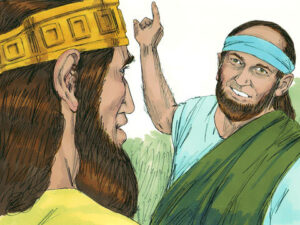 Hezekiah, son of Ahaz, ruled Judah as a faithful king. 2 Kings 18 tells us, “He did right in the sight of the Lord, according to all that his father David had done. He removed the high places and broke down the sacred pillars and cut down the Asherah. He also broke in pieces the bronze serpent that Moses had made, for until those days the sons of Israel burned incense to it; and it was called Nehushtan. He trusted in the Lord, the God of Israel; so that after him there was none like him among all the kings of Judah, nor among those who were before him. For he clung to the Lord; he did not depart from following Him, but kept His commandments, which the Lord had commanded Moses.” (2 Kings 18:3–6)
Hezekiah, son of Ahaz, ruled Judah as a faithful king. 2 Kings 18 tells us, “He did right in the sight of the Lord, according to all that his father David had done. He removed the high places and broke down the sacred pillars and cut down the Asherah. He also broke in pieces the bronze serpent that Moses had made, for until those days the sons of Israel burned incense to it; and it was called Nehushtan. He trusted in the Lord, the God of Israel; so that after him there was none like him among all the kings of Judah, nor among those who were before him. For he clung to the Lord; he did not depart from following Him, but kept His commandments, which the Lord had commanded Moses.” (2 Kings 18:3–6)
God honored Hezekiah’s faithfulness in many ways. He was successful in war, even when the only way to victory was through a remarkable miracle of God.
Once day, the Lord sent to Hezekiah Isaiah the Prophet. “The Lord tells you that you are to put everything in order because you will not recover. Get ready to die.” (Isaiah 38:1)
Upon hearing this devastating news, Hezekiah turned to the wall and earnestly prayed to the Lord, pouring out his heart with tears. He reminded God of his faithfulness and devotion and pleaded for mercy and healing. Moved by Hezekiah’s sincere prayer, God responded to him through Isaiah, saying, “I have heard your prayer, I have seen your tears; surely I will heal you.”
The Lord instructed Isaiah to deliver a message to Hezekiah, assuring him that he would be granted fifteen more years of life. In addition to this miraculous extension of his life, God promised to deliver the city of Jerusalem from the hands of the Assyrian king, Sennacherib, who posed a great threat to the kingdom of Judah.
To further validate the authenticity of Isaiah’s message, God performed a remarkable miracle. He caused the shadow on the sundial of Ahaz, located in the courtyard of the king, to move backward by ten steps. This backward movement of the sun’s shadow served as a sign to Hezekiah that God would indeed fulfill His promise.
Manasseh was so bad, moreover, that God swore He would judge Judah for Manasseh’s sins, sending them into exile in Babylon. Had Hezekiah not been healed, Manasseh would have been born. If Manasseh had not been born, who can say what would have happened to Judah?
Minor Prophets
Zephaniah
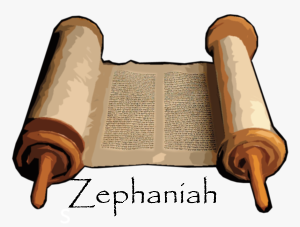 Who wrote Zephaniah? Zephaniah was a prophet who wrote this prophecy when Josiah (Manasseh’s grandson) was king. He almost certainly spoke this prophecy from the city of Jerusalem.
Who wrote Zephaniah? Zephaniah was a prophet who wrote this prophecy when Josiah (Manasseh’s grandson) was king. He almost certainly spoke this prophecy from the city of Jerusalem.
Where does this book fit into God’s great salvation story? Since we know that Zephaniah wrote during the days of Josiah, we know that these words were spoken in the final decades before God’s judgment came upon Judah. That tells us a lot about this prophecy. The wicked actions of King Manasseh (Josiah’s grandfather) led Yahweh to bring irreversible judgment on Judah, promising that in the future he would destroy the Temple and the city of Jerusalem and send the people of Judah into exile. At the end of his life, King Manasseh had repented from his sin and had turned back to Yahweh, but it was too late; the damage had been done and God’s judgment would come soon.
Who were the original readers of Zephaniah? The people who first heard and then read these words were almost all idolators, influenced by King Manasseh and then by his son Amon, who was just as bad as his father had been. The people’s hearts still sought to worship idols, including King Josiah at first, since he was just 8 years old when he became king. It was not until Josiah was 16 that he began following Yahweh, perhaps influenced by Zephaniah’s preaching (we don’t know). 4 years later, when he was 20 years old, Josiah started a courageous work of cleansing Judah from the many idols and shrines that were dedicated to gods and goddesses, the sun, moon, stars, etc.
What led the author to write Zephaniah? Zephaniah was calling the people of Judah, possibly even including young King Josiah, to repent from their idolatry and turn to serving Yahweh alone. God had already revealed to many prophets that judgment was coming quickly because idolatry was written deep into their hearts.
What did the author want to change in his original readers? Zephaniah preached to bring his readers to repent. Zephaniah prophesied that not only Judah, but many other nations also would be judged by God. There seemed to be no escape from this coming disaster (because of Manasseh’s sins), but even still, the people of Judah needed to return to Yahweh (as Josiah did when he was 16 years old). And then, at the end of this book, Zephaniah reassures God’s people that a remnant will return and will “do no wrong and tell no lies.” This is a promise for the future when the Messiah will rule Jerusalem. Zephaniah wanted his idolatrous readers to turn from idolatry, but also wanted to encourage the few faithful believers to know that the Messiah would bring a remnant back to Judah in the future and will give them “renown and praise among all the peoples of the earth when I restore your fortunes before your eyes.”
God’s PRESENCE left Israel & the people were exiled from the LAND
God’s PRESENCE left Israel & the people were exiled from the LAND
God’s PRESENCE left the temple because of Israel’s sin
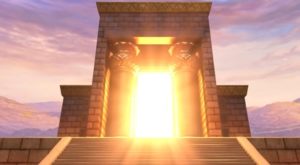 Israel’s sin was so terrible that God send the foreign nation of Babylon to defeat Israel’s armies. The Babylonians took some of Israel’s most gifted leaders, such as Daniel and Ezekiel, and led them away into exile in far away Babylon. One evening, God revealed a vision to Ezekiel, who was exiled in Babylon. It was a vision of the temple in Jerusalem, the place where God’s PRESENCE dwelt.
Israel’s sin was so terrible that God send the foreign nation of Babylon to defeat Israel’s armies. The Babylonians took some of Israel’s most gifted leaders, such as Daniel and Ezekiel, and led them away into exile in far away Babylon. One evening, God revealed a vision to Ezekiel, who was exiled in Babylon. It was a vision of the temple in Jerusalem, the place where God’s PRESENCE dwelt.
It this vision, the PRESENCE of God lifted up from the Most Holy Place and moved to the doorway of the Temple. Then the PRESENCE of God left the Temple, NEVER TO RETURN until God the Son came to the Temple centuries later.
God’s PRESENCE had been with Israel since the pillar of cloud/fire when Israel left Egypt but now it was gone.
The Prophets
Jeremiah
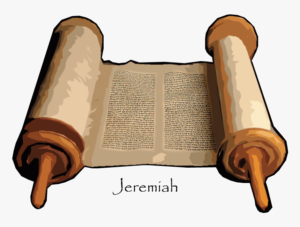 Who wrote Jeremiah? A Hebrew named Jeremiah wrote this book, speaking these prophecies over many years and to several different kings. He was a courageous man who suffered much during his ministry, both from persecution and also from the effects of God’s judgment on all of Israel.
Who wrote Jeremiah? A Hebrew named Jeremiah wrote this book, speaking these prophecies over many years and to several different kings. He was a courageous man who suffered much during his ministry, both from persecution and also from the effects of God’s judgment on all of Israel.
When did the author write Jeremiah?
Jeremiah lived EXACTLY during the time that God judged Israel for Manasseh’s idolatry and especially his cruel treatment of God’s people. He ministered AFTER Manasseh’s rule and BEFORE Israel’s return to Judah from exile.
Who were the original readers of Jeremiah?
Hebrews living during the days of God’s punishment. These were people who were worshipping idols and were going through a horrible experience of war, suffering, starvation and finally exile to a foreign land. They did not want to listen to any prophet and they did not care about what Jeremiah said.
What led the author to write Jeremiah?
God had revealed to many prophets that judgment was coming to Israel because of Manasseh’s sins and because of the people’s idolatry. Jeremiah knew that the armies of Babylon would invade the nation and destroy the land, taking many Hebrews into exile far away. He also knew that in the future, God would bring them back and in the distant future, the Messiah would come to lead all the Hebrews to love God and serve Him.
What did the author want to change in his original readers?
Jeremiah wanted the Hebrews to repent, which means to admit their sins and turn from their sins and back to God. Jeremiah also wanted the Hebrews to trust in God alone and to stop trusting in idols and their many false prophets. Finally, he wanted the Hebrews to trust in God’s promise that He was sending them a Messiah who would make everything right.
The Prophets
Lamentations
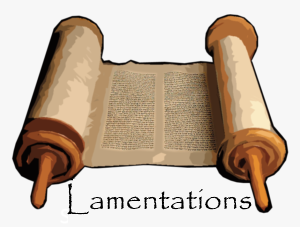 Who wrote Lamentations? A Hebrew named Jeremiah wrote this book, speaking these 5 songs these prophecies over many years and to several different kings. He was a courageous man who suffered much during his ministry, both from persecution and also from the effects of God’s judgment on all of Israel.
Who wrote Lamentations? A Hebrew named Jeremiah wrote this book, speaking these 5 songs these prophecies over many years and to several different kings. He was a courageous man who suffered much during his ministry, both from persecution and also from the effects of God’s judgment on all of Israel.
The book is divided into five songs, the first four written as an acrostic based on the Hebrew alphabet (an acrostic is a technique of writing where each line is started with a specific letter of the alphabet). The last song is a heartbreaking prayer which does not follow the acrostic pattern.
Each of the songs has a different perspective. The first song starts off by describing the horrors in Jerusalem and then switches to speak as Jerusalem herself mourning her terrible situation. The second song is Jeremiah’s words to Judah as Yahweh’s prophet. The third some, however, is an intensely intimate revelation of Jeremiah’s personal grief and the unfailing hope he has because of Yahweh’s lovingkindness and faithfulness. The fourth song returns again to a prophetic description of the suffering of Jerusalem and the final chapter is Jeremiah’s prayer to God on behalf of God’s people.
When did the author write Lamentations? Jeremiah lived EXACTLY during the time that God judged Israel for Manasseh’s idolatry and especially his cruel treatment of God’s people. He ministered AFTER Manasseh’s rule and BEFORE Israel’s return to Judah from exile.
Who were the original readers of Lamentations? Hebrews living during the days of God’s punishment. These were people who were worshiping idols and were going through a horrible experience of war, suffering, starvation and finally exile to a foreign land. They did not want to listen to any prophet and they did not care about what Jeremiah said.
What led the author to write Lamentations?
God had revealed to many prophets that judgment was coming to Israel because of Manasseh’s sins and because of the people’s idolatry. Jeremiah wrote this at the moment that the Babylonians had destroyed the city of Jerusalem. Many and perhaps most of the Jews living in Jerusalem had died or were being dragged away into exile. Starving children wandered through the streets searching for food that did not exist. Jeremiah wrote this book to express his grief, appeal to the Jews still alive to seek God’s help and deliverance, and to point his readers to Yahweh and His great faithfulness.
What did the author want to change in his original readers? Jeremiah wanted his readers to turn back to Yahweh and trust in His mercies; accepting the harsh sufferings they were experiencing in hope that good would come to them again some day.
The Minor Prophets
Habakkuk
No other book is like Habakkuk. Habakkuk ministered at the worst of all times in Judah’s history. Because King Manasseh’s sins were so terrible, the nation was to be judged and sent into exile, defeated and carried away by Babylon. Probably Habakkuk’s ministry began after the last good king, King Josiah, was gone and Judah’s society was falling into terrible idolatry and moral wickedness. The wealthy and powerful people were cheating and bullying those who were poor and powerless, much like the situation before that Amos spoke about.
But Habakkuk saw that the end was going to be even worse. God had chosen wicked Babylon as His divine tool of judgment! This prophecy is about Habakkuk’s struggle to understand how a holy God could use a wicked nation to judge a nation less wicked! It is not so much a prediction, although it does tell the future, as it is a message explaining how God works to bring about justice.
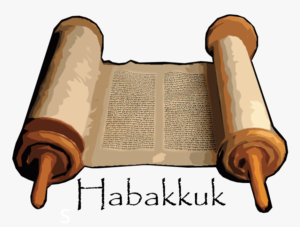 Who wrote Habakkuk? We do not have any information about Habakkuk except that he was a prophet named Habakkuk.
Who wrote Habakkuk? We do not have any information about Habakkuk except that he was a prophet named Habakkuk.
When did the author write Habakkuk? Habakkuk lived EXACTLY during the time that God judged Israel for Manasseh’s idolatry from the past, especially for Manasseh’s cruel treatment of God’s people. Habakkuk ministered just AFTER Josiah’s rule and RIGHT BEFORE Babylon invaded Israel the first time.
Who were the original readers of Habakkuk? These were Hebrews living during the days of God’s punishment. Most were worshiping idols and were about to go through a horrible experience of war, suffering, starvation and finally exile to a foreign land. Those Hebrews did not want to listen to any prophet and they did not care about what the prophets said. However, having said that, it does not seem that Habakkuk is writing to these people, but maybe to the righteous few who still loved the Lord. These people would be like Habakkuk, wondering how a righteous God could use a wicked nation to do His work.
What led the author to write Habakkuk? Habakkuk wondered how the Holy God could use filthy Babylon to accomplish His will. Surely he was not alone in this confusion. So, it is most likely that Habakkuk wrote this book to encourage the godly believers in Judah that God was still utterly holy and at the same time utterly just.
What did the author want to change in his original readers? Based on the main theme and the fact that the 3rd chapter is a remarkable song of praise to God, Habakkuk wanted his readers to see God in all of this holiness as being utterly righteous and just in everything He did. When facing God’s hand of judgment, these readers needed to accept God’s wrath as right and see God’s final judgment as utterly pure. Otherwise, they might worry that the invasion of Babylon was somehow a failure on God’s part rather than a reminder that God was doing the exactly right thing; bringing justice to His wicked people (Judah) while also preparing Babylon to be judged soon enough for their own pride and wickedness.
The Prophets
Kings (1 & 2 Kings)

Who wrote Kings? Ancient Hebrew traditions believe that the Prophet Jeremiah wrote Kings (there is only 1 book–Kings–in the Hebrew Bible, which our Bibles split into 2 books, 1 and 2 Kings). It seems as if after this, a different Jew who lived in exile in Babylon wrote the last page of the book, describing Judah’s defeat and the exile of so many Jews from Judah and Jerusalem to Babylon, so far away.
When did the author write Kings? The best guess is that Kings was written in 2 stages. At the end of when the kings of Judah ruled in Jerusalem, one person wrote all of what we call 1 Kings and almost all of what we call 2 Kings all the way through the end of chapter 23 and maybe even through the end of chapter 24. Then, after Babylon defeated Judah and took the Jews from Judah into exile, from that place in exile another person wrote the last part, which would be possibly chapter 24 and certainly chapter 25.
Who were the original readers of Kings? Almost certainly, the first people to read Kings were Jews (Hebrews and Jews are just different words for the same people) living in exile in Babylon, there because God had punished them or their parents for idolatry and terrible sin during Judah’s last days in the promised land. While they were there in exile, these Jews began realizing they had been fools for worshiping idols. These Jews turn away from idolatry and began worshiping God alone.
What led the author to write Kings?
The Jews living in exile needed to understand WHY they were so far from home and WHAT THEY COULD DO to return. They needed to understand how idolatry had destroyed everything good, starting with Solomon onward. They also needed to understand God’s faithful love and mercy in waiting for centuries before bringing His final judgement.
What did the author want to change in his original readers? The author wanted the Hebrews to repent, which means to admit their sins and turn from their sins and back to God. The author wanted the Jews in exile (the name “Jew” is another word for Hebrew and is the normal word used to describe the Hebrew people in exile) to realize that the kings and the people had broken their covenant with God and the exile was the only possible result of such rebellion.
God’s PRESENCE left Israel & the people were exiled from the LAND
The Babylonians destroyed the temple and led the people from the LAND
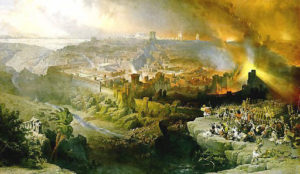 Once God’s PRESENCE was gone, God was ready for the worst to happen; He was exiling His chosen people from the LAND. God had warned through the prophets this would happen, but the people not only refused to listen, they actually MURDERED the prophets.
Once God’s PRESENCE was gone, God was ready for the worst to happen; He was exiling His chosen people from the LAND. God had warned through the prophets this would happen, but the people not only refused to listen, they actually MURDERED the prophets.
God again sent the armies of Babylon, who conquered the LAND in 587 BC and took thousands and thousands of Hebrews away, leading them to Babylon, which was far away.
The Babylonians tore down the walls of Jerusalem, burned the city, destroyed the Temple and killed many, many people.
The LAND was the place where God had promised to BLESS the people. There was no BLESSING outside of the LAND, no BLESSING in Egypt, no BLESSING in Babylon.
The Major Prophets
Ezekiel
People who read Ezekiel are surprised by strange images, shocking descriptions and confusing future prophecies. Perhaps it might be helpful to spend more time than usual explaining this puzzling book.
- In 597 BC, Nebuchadnezzar, the King of Babylon, conquered Judah. He took 10,000 of the Hebrew officials and craftsmen and another 7000 soldiers and brought them to Babylon. There the King had his servants train these Hebrews in the language and customs of Babylon. Ezekiel was one of these men.
- Meanwhile, back in Jerusalem, at first, the Jews there (another word for Hebrew) continued on with life, serving Nebuchadnezzar by paying him large amounts of money every year. We know from the prophet Jeremiah that life was far from easy during these years.
- During the next 10 years, God spoke to the Jews in Babylonian exile through letters from Jeremiah who was in Jerusalem as well as through prophecies by Ezekiel himself. Both Jeremiah and Ezekiel warned the people that God was going to send the armies of Babylon BACK to defeat Judah and carry much of that nation into exile and destroy the city and temple, BUT THE JEWS DID NOT BELIEVE EITHER PROPHET!
- We learn from Jeremiah and Ezekiel that the Jews who were still in Jerusalem were just as idolatrous and wicked as they had been before being punished by Babylon’s armies. We learn from Ezekiel that the exiled Jews living in Babylon hadn’t changed either!
- People today are shocked by the images that Ezekiel uses to describe the Jews living in Jerusalem during those days, because they are sometimes sexual in nature. We have to remember the people to whom he was writing were committing horrible idolatry, offering their children as sacrifices to their disgusting idols. We need to remember as well that their religion included male and female temple prostitutes in their so-called religious activities. Ezekiel’s shocking images are meant to force the Jews both in exile and in Jerusalem to realize that their worship of idols was like filthy prostitution of the worst sorts!
- When we read Ezekiel, we realize that in God’s eyes, the Jews were God’s holy bride and idolatry was the worst kind of adultery one could commit!
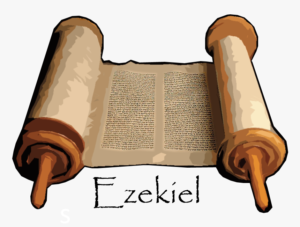 Who wrote Ezekiel? Ezekiel came from a family of priests, which means he was descended from Aaron. He was 30 years old when he began prophesying, about 5 years after he had been carried away into exile by Nebuchadnezzar’s armies. We know he was married and that his wife died about 5 years after Ezekiel starting writing prophecies.
Who wrote Ezekiel? Ezekiel came from a family of priests, which means he was descended from Aaron. He was 30 years old when he began prophesying, about 5 years after he had been carried away into exile by Nebuchadnezzar’s armies. We know he was married and that his wife died about 5 years after Ezekiel starting writing prophecies.
When did the author write Ezekiel? Ezekiel lived EXACTLY during the time that God used Babylon to judge Israel for their idolatry (especially King Manasseh’s idolatry from the past, including for Manasseh’s cruel treatment of God’s people). Ezekiel ministered just AFTER Nebuchadnezzar defeated Israel the first time in 597 BC. He wrote about Nebuchadnezzar’s armies final conquest of Jerusalem in 587 BC, when Babylon’s armies completely destroyed Jerusalem and the Temple. Ezekiel continued to ministry for 17 more years after this.
Who were the original readers of Ezekiel? These were Hebrews living during the days of God’s punishment, at first some living in Jerusalem (reading Ezekiel’s letters to them) and others living with Ezekiel in Babylon. Most were worshiping idols and were going through horrible experiences of war, suffering, starvation and finally exile to a foreign land. These Hebrews were not ready yet to obey what any prophet said, although the ones in Babylon did actually hear his prophecies eagerly.
What led the author to write Ezekiel? Ezekiel understood that the Jews in exile and the Jews in Jerusalem had not yet faced the fact that all of their troubles had come to them because they were in spiritual adultery, sinning against their “husband” Yahweh (the Hebrew name for God). Until they dealt with this problem, they would never find the peace they longed for.
What did the author want to change in his original readers? Ezekiel wrote to convince the Jews living in Jerusalem to repent from their idolatry and wickedness as well as to convince the exiled Jews living with him in Babylon to humble themselves before God and beg Him for His merciful forgiveness. Although it seems as if nobody took his prophecies seriously, God must have used them, because there in exile in a very idolatrous country of Babylon, the Jews finally turned from worshiping idols to worshiping God alone.
The Major Prophets
Daniel
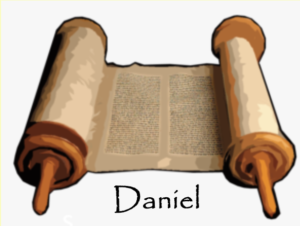 Who wrote Daniel? Babylon conquered Jerusalem twice. The first time, the King of Babylon decided to bring the most talented young men and women from Jerusalem to Babylon, training them to serve him as administrator’s, skilled craftsmen, and soldiers. Daniel was one of those young men, as was also Ezekiel. He wrote this book which contains important history as well as remarkable prophecies about Daniel’s times and especially about future events all the way to 2nd coming of Jesus Christ.
Who wrote Daniel? Babylon conquered Jerusalem twice. The first time, the King of Babylon decided to bring the most talented young men and women from Jerusalem to Babylon, training them to serve him as administrator’s, skilled craftsmen, and soldiers. Daniel was one of those young men, as was also Ezekiel. He wrote this book which contains important history as well as remarkable prophecies about Daniel’s times and especially about future events all the way to 2nd coming of Jesus Christ.
When did the author write Daniel? Daniel wrote this book over a period of 60-70 years, starting at the point when Babylon first conquered Jerusalem, when he was a very young man and finishing some 60 to 70 about 9 years after Persia conquered Babylon. This began AFTER Kings Manasseh and Josiah (Manasseh’s grandson) and during the time when the final kings of Judah ruled for short periods of time on the throne in Jerusalem. Daniel’s ministry continued long after Judah ceased as an independent country.
Who were the original readers of Daniel? Two completely different groups of people first read Daniel’s writings. First, Daniel wrote to the exiled Hebrews living in Babylon. To these people, Daniel wrote in Hebrew. In addition, however, Daniel also wrote in Aramaic, the language of his Babylonian masters. There are many prophecies in this book which predict the futures of Babylon, Persia, Greece and Rome.
What led the author to write Daniel? Daniel wanted his original readers to be courageous in an idolatrous exile and to strengthen themselves to remain true to Yahweh and His Law and ways. Daniel also wanted his original readers to understand that Yahweh is Lord over all the nations and will fulfill His perfect plan to bring Messianic glory in the days to come.
What did the author want to change in his original readers? Daniel wrote to inspire the Jews to obey God’s Law and to call his Gentile masters to turn to Yahweh, the only true God and Lord over all the nations (including Babylon and Persia).
God’s PRESENCE left Israel & the people were exiled from the LAND
In Babylon, the Hebrews finally turned from idolatry
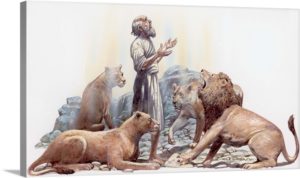 During their sad and difficult days living in Babylon, the Hebrews finally understood that they could not love idols AND God. There in exile they decided to serve God alone. They began praying for God to return them to their beloved Jerusalem, even though the city as burned and the Temple was destroyed.
During their sad and difficult days living in Babylon, the Hebrews finally understood that they could not love idols AND God. There in exile they decided to serve God alone. They began praying for God to return them to their beloved Jerusalem, even though the city as burned and the Temple was destroyed.
And there, far from the LAND, without God’s PRESENCE or BLESSING, even so the SEED of Eve continued to pass from generation to generation. When a counselor to the ruling king tried to destroy all of the Hebrew people, now known as Jews, God used Queen Esther to save them from death. This saved God’s chosen SEED to be passed on to another generation.
God’s PRESENCE left Israel & the people were exiled from the LAND
The Jews returned to the LAND and the SEED continued to pass from generation to generation
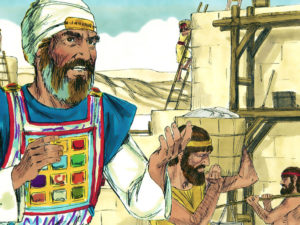 After 70 years in exile, God brought the Jews (same as Hebrews, but they were now called Jews) back into the LAND. Sadly, Jerusalem was broken down and the temple was destroyed. Prophets called on the people to rebuild the Temple and walls of the city and they began the hard work.
After 70 years in exile, God brought the Jews (same as Hebrews, but they were now called Jews) back into the LAND. Sadly, Jerusalem was broken down and the temple was destroyed. Prophets called on the people to rebuild the Temple and walls of the city and they began the hard work.
They did rebuild the city, including the Temple, but God’s PRESENCE did not return. There were times when good things happened, but God’s BLESSING was gone.
However, the Jews never again returned to worshiping idols. They obeyed God’s Law, even when persecuted by foreign nations. And they waited for the final SEED of Eve to come, who would crush Satan.
They often called this SEED the Messiah. Many prophecies predicted that Eve’s seed would be a mighty ruler all over the world.
The prophets sometimes described the seed of Eve as if he were God Himself
The Jews read their Scriptures and waited for the final Seed of Eve to deliver them
The Post-exilic Prophets
Haggai
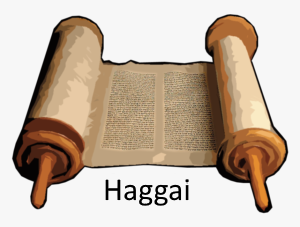
Who wrote Haggai? Haggai played a significant role in the post-exilic period of Israel’s history. He emerged during a time when the Jewish people had returned from Babylonian captivity and were struggling to rebuild their temple in Jerusalem. Haggai’s prophetic message emphasized the importance of prioritizing the reconstruction of the temple and renewing their commitment to God’s covenant. He encouraged the people to overcome their apathy and prioritize spiritual matters over material concerns. Haggai’s words inspired the community to resume the construction of the temple, fostering a renewed sense of hope and faith among the Israelites. His short but impactful prophetic ministry served as a catalyst for the restoration of the religious and national identity of the Jewish people in the post-exilic era.
When did the author write Haggai? Haggai wrote this prophecy 70 years after the first Jews had gone into exile in Babylon. The Jews had returned to Jerusalem and life there was very difficult indeed. The city was a ruin and the temple had been destroyed. Although the Jews had begun to work on the temple, apparently it was simply too hard and they seem to have given up.
Why did Haggai write this book? Haggai saw both the unfinished temple and the fact that the Jews gave higher priority to many other issues in their lives, especially in their farming and home-building. Haggai knew that the Jews first priority should have been rebuilding that temple, as hard as that would be. He also saw the discouragement of Zerubbabel, David’s descendant and wanted to stir him to be the leader he needed to be.
Who were the original readers of Haggai? The original readers were Jews who faced almost overwhelming obstacles in rebuilding their lives. The Babylonians have destroyed so much of the city and the surrounding areas and the work of rebuilding the temple was too much. Also, many of them were building nice homes for themselves rather than building the house of God. These are people who no longer worship idols and trusted Yahweh, but needed to be reminded of their task at hand.
What led Haggai to write this book? Haggai wanted the Jews to make the rebuilding of the temple to be their first and highest priority and He also wanted to inspire Zerubbabel to be the leader the people needed him to be. Remember, the main purpose of the Temple was offering sacrifices to cleanse the people from their uncleanness, so the building of the Temple was the highest priority in God’s eyes.
What did Haggai want to change in his original readers? Haggai wanted to inspire his readers to put God’s presence and Temple above their own desires and even needs and to trust Yahweh to supply everything they needed. In fact, even though they had planted fields and vineyards, thus far nothing had grown well; God was teaching them to put His temple first so that He would fill their harvests.
The Post-exilic Prophets
Zechariah
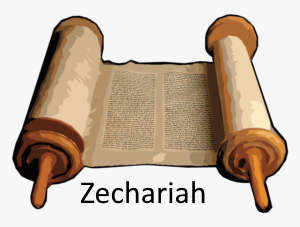
Who was Zechariah? Zechariah embarked on his ministry during a critical period of Israel’s history, following the return of the exiled Jewish community from Babylon. His prophetic messages were filled with symbolic visions and powerful imagery, revealing divine insights and encouraging spiritual renewal among the people. Zechariah’s ministry encompassed various themes, including the restoration of Jerusalem, the rebuilding of the temple, and the coming Messiah. He called the people to repentance, emphasizing the importance of righteousness, mercy, and justice. Zechariah’s prophecies also highlighted future events, such as the triumph of God’s kingdom and the ultimate reconciliation of all nations. Through his visionary messages, Zechariah played a vital role in bolstering the faith of the returned exiles, inspiring them to persevere in their mission to rebuild and reaffirm their covenant with God.
When did Zechariah write Zechariah? Zechariah wrote this prophecy after the Jews had return to Jerusalem from their exile in Babylon, where some of them had had lived for many years. The Jews had returned to Jerusalem and life there was very difficult indeed. The city was a ruin and the temple had been destroyed. Zechariah and Haggai spoke to the people at about the same time, but they had different focuses. Zechariah does talk about the Temple they were building, but he most often talked about the great battles ahead leading up to a new Temple during the rule of the Messiah.
Why did Zechariah write this book? Zechariah first spoke during the days that the Jews were rebuilding the Temple, using prophetic images and symbols to describe God’s future plans for Jerusalem AND His future judgment of nations and people unfaithful to him. After the temple was completed, he wrote amazing predictions about the coming King, the Messiah.
Who were the original readers of Zechariah? The original readers were Jews who faced almost overwhelming obstacles in rebuilding their lives. The Babylonians have destroyed so much of the city and the surrounding areas and the work of rebuilding the temple was too much. Also, many of them were building nice homes for themselves rather than building the house of God. These are people who no longer worship idols and trusted Yahweh, but needed to be reminded of their task at hand. These people needed to see that a glorious future awaited Jerusalem when the Messiah came in glory, although the Messiah would first be rejected and pierced.
What led Zechariah to write this book? Zechariah knew that the true city and the true temple awaited the coming of the Messiah. However, there would be many battles and attacks against God’s people before the Messiah finally established His throne in glory and ruled in power over all the nations.
What did Zechariah want to change in his original readers? Zechariah wanted his readers to understand that all of the struggles they were now facing would turn to joy during the days of the Messiah. The Jews needed to work hard and build God’s temple now, because it was the first step for a much greater temple will be built by the branch of David, the Messiah and He will sit on His throne and bring true peace.
The Post-exilic Prophets
Malachi
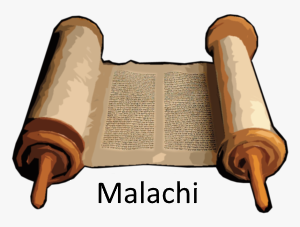
Who was Malachi? Malachi, the final prophet of the Hebrew Bible, ministered during a time when the Jewish community had become disillusioned and distant from their covenant with God. With a passionate and confrontational style, Malachi fearlessly confronted the religious apathy, moral compromise, and social injustice that plagued the people. He rebuked the priests for their corrupt practices, challenged the people’s insincere worship, and addressed issues of marital unfaithfulness and economic exploitation. Through his prophetic words, Malachi sought to restore the people’s faith and commitment, reminding them of God’s love, justice, and covenantal promises. He foretold the coming of the Messiah, who would refine and purify them. Malachi’s ministry served as a stern wake-up call, urging the people to return to their God with wholehearted devotion and integrity, and rekindle their relationship with Him.
When did the author write Malachi? Malachi may have been the last prophetic book written in the Bible, although this cannot be said for certain. The name “Malachi” normally would mean, “My messenger”, which is a meaningful name for this messenger of Yahweh. Malachi seems to have begun his ministry right before Nehemiah came to rebuild the walls of Jerusalem.
Why did Malachi write this book? The Jews had returned to Jerusalem almost 100 years before Malachi preached. They had long ago completed building the Temple, but had, for the most part, left Jerusalem in ruin. The people were weak in their faith, gave blemished offerings for the temple, were not generous in giving to the Lord’s work, and mistreated their wives. These are the problems Malachi tried to fix.
Who were the original readers of Malachi? Many of these Jews had lived in Judah their entire lives and had never experienced the exile. They found the requirements of the Law regarding the temple sacrifices to be tiresome, because they did not have the personal experience of having seen the temple torn down by the Babylonians or being in exile and far from the Temple sacrifices.
What led Malachi to write this book? Malachi called the people to be generous to Yahweh, faithful to their wives, joyful in their worship and longing for the coming of the Messiah. He also gave the world prophecy preparing the way for God to come to His temple after a messenger (fulfilled by John the Baptist) had prepared His way.
What did Malachi want to change in his original readers? Malachi’s needed to realize that they must stop treating God with disrespect by bringing lame and sick animals for sacrifice. They must treat their wives properly and teach the people God’s holy truth. And, future readers of Malachi must be ready for the Messiah’s coming in glory to the temple.
The Jews read their Scriptures & waited for the final SEED of Eve to deliver them
When the Jews returned to the LAND, they read the many predictions about the SEED, whom they called Messiah
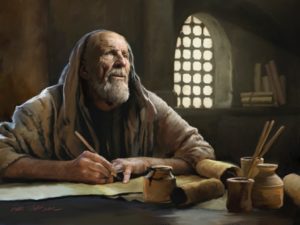 The Jews (another later name for the Hebrews) were back in their LAND, but God’s PRESENCE was not with them. They began reading their Scriptures and finding many promises about a descendant of David who would save them.
The Jews (another later name for the Hebrews) were back in their LAND, but God’s PRESENCE was not with them. They began reading their Scriptures and finding many promises about a descendant of David who would save them.
Some of these prophecies were very ancient, such as Jacob’s blessing of Judah, which promised that Judah’s descendants would rule on a throne until “He whose right is is comes…” Some of the prophecies described where Eve’s seed would be born (Bethlehem), where He would minister (Galilee) or how He would live (in righteousness and justice).
The Jews read their Scriptures & waited for the final SEED of Eve to deliver them
Many prophecies predicted that Eve’s SEED would be a mighty ruler over all the world
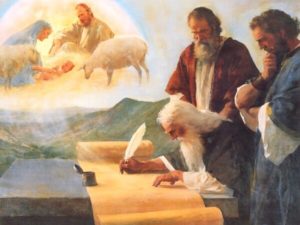 Many of the prophecies said that this Person would rule over all of the nations. He would make Jerusalem to be the capital of the world. This Person would bring peace to our planet. Everyone on earth would praise Him and would give Him honor.
Many of the prophecies said that this Person would rule over all of the nations. He would make Jerusalem to be the capital of the world. This Person would bring peace to our planet. Everyone on earth would praise Him and would give Him honor.
Some passages promised wonderful prosperity in Israel, with fruitful farms and many children and long lifespans. And even though Israel had been punished by God and exiled from His PRESENCE, this Person would lead them back to Jerusalem and to God’s favor.
The Jews read their Scriptures & waited for the final SEED of Eve to deliver them
The Prophets sometimes described this SEED of Eve as if He were God
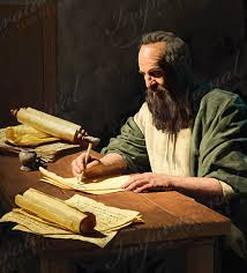 Some Jews might have been confused by descriptions of the SEED which made Him sound like more than a man. For example, the prophet Daniel wrote this:
Some Jews might have been confused by descriptions of the SEED which made Him sound like more than a man. For example, the prophet Daniel wrote this:
“ I continued watching in the night visions, and I saw One like a son of man coming with the clouds of heaven. He approached the Ancient of Days and was escorted before Him. 14 He was given authority to rule, and glory, and a kingdom; so that those of every people, nation, and language should serve Him. His dominion is an everlasting dominion that will not pass away, and His kingdom is one that will not be destroyed.” (Daniel 7:13–14)
Isaiah wrote something even more amazing:
“ For a child will be born for us, a son will be given to us, and the government will be on His shoulders. He will be named Wonderful Counselor, Mighty God, Eternal Father, Prince of Peace. 7 The dominion will be vast, and its prosperity will never end. He will reign on the throne of David and over his kingdom, to establish and sustain it with justice and righteousness from now on and forever. The zeal of the Lord of Hosts will accomplish this.” (Isaiah 9:6–7)
A child will be born who will be called Mighty God and Eternal Father!
The Jews read their Scriptures & waited for the final SEED of Eve to deliver them
The prophets also described this SEED of Eve being rejected and executed by His own People
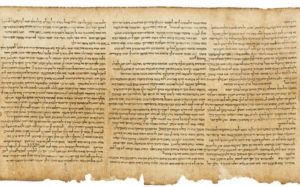 Some of the prophecies about the SEED, who was often called the Messiah, said that Israel would reject Him. Isaiah said that he would be pierced for our sins against God and crushed for our very worst sins. Isaiah wrote that the punishment that we should have received would fall upon the Messiah. There is a long and clear description of how the Messiah would die in Isaiah chapters 52-53. This picture is an ancient copy of those chapters copied down long before Jesus Christ was even born.
Some of the prophecies about the SEED, who was often called the Messiah, said that Israel would reject Him. Isaiah said that he would be pierced for our sins against God and crushed for our very worst sins. Isaiah wrote that the punishment that we should have received would fall upon the Messiah. There is a long and clear description of how the Messiah would die in Isaiah chapters 52-53. This picture is an ancient copy of those chapters copied down long before Jesus Christ was even born.
The prophet Daniel wrote:
“ After those 62 weeks the Messiah will be cut off and will have nothing. The people of the coming prince will destroy the city and the sanctuary. The end will come with a flood, and until the end there will be war; desolations are decreed.” (Daniel 9:26)
The Jews read their Scriptures & waited for the final SEED of Eve to deliver them
Malachi, one of the last books, tells of Yahweh coming to Israel
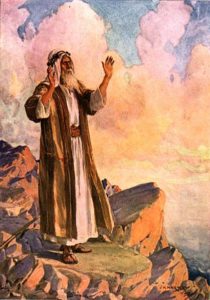 The Prophet Malachi wrote the last book of the Old Testament in the English Bible. Chronicles is the last book in the Hebrew Bible. Malachi writes: “The LORD Almighty answers, “I will send my messenger to prepare the way for me. Then the Lord you are looking for will suddenly come to his Temple. The messenger you long to see will come and proclaim my covenant.” (Malachi 3:1)
The Prophet Malachi wrote the last book of the Old Testament in the English Bible. Chronicles is the last book in the Hebrew Bible. Malachi writes: “The LORD Almighty answers, “I will send my messenger to prepare the way for me. Then the Lord you are looking for will suddenly come to his Temple. The messenger you long to see will come and proclaim my covenant.” (Malachi 3:1)
The Lord Himself would come! A messenger would prepare the way first (this was John the Baptist) and then the Lord God would appear to them. Isaiah had already written about this messenger:
“ A voice of one crying out: Prepare the way of the Lord in the wilderness; make a straight highway for our God in the desert… And the glory of the Lord will appear, and all humanity together will see it, for the mouth of the Lord has spoken.” (Isaiah 40:3–5)
And so the Jews waited and prayed for God’s messenger to prepare the way for the coming of the Messiah, the SEED of Eve, the glory of the Lord.
The Post-exilic Prophets
1 & 2 Chronicles
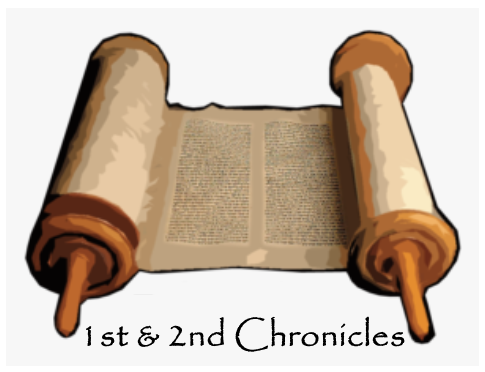
Who wrote Chronicles? (It’s 1 book, not 2) The books of 1 and 2 Chronicles in the Old Testament serve as historical records that mostly focus on the lineage of Israel’s kings, the genealogies of the tribes, and the establishment and functions of the temple and priesthood. The author’s main purpose for writing these books appears to be threefold: to provide a comprehensive account of the nation’s history, particularly from a religious and spiritual perspective, to foster a sense of national and religious identity among the post-exilic community, and especially to call his readers to prepare for the coming of the Messiah, who will bring righteousness and peace to the Jews and the entire world
When did this unnamed prophet write Chronicles (It’s 1 book, not 2)? An unnamed prophet wrote this book a long time after the Jews (i.e., Hebrews) returned to Jerusalem under Zerubbabel. It could have been written 450 years before Jesus was born, but more likely was written later, perhaps about 430 year before Jesus or even 400 years before Jesus. Based on the genealogies, which stop at around 400 BC, it was not written any later than that (remember, 400 BC is LATER than 450 BC!).
Why did this unknown Prophet write this book? The history of the human race, especially God’s chosen people the Hebrews, had proven that no institution could withstand the corrupting influence of sin. Long after the exiles of Northern kingdom of Samaria (to Assyria) and Southern Kingdom of Judah (to Babylon), the prophet who wrote Chronicles presented God’s solution, the Messiah, who would be a King after God’s heart (shown in David) who was wise, glorious, peaceful (shown in Solomon). To prepare for this coming Messiah, Israel would need a glorious temple, purified service, proper worship and utter commitment to Yahweh and Yahweh alone.
Who were the original readers of Chronicles? None of the first readers of Chronicles had seen the Temple designed by David and built by Solomon in its glory, but rather a poor imitation. None of the original readers had known the fabulous wealth of Solomon at the height of Israel’s power. Chronicles shows how the idolatry and injustice of the Kings who followed David and Solomon destroyed Israel; only the Messiah could restore them to what they should be.
What led the unknown Prophet to write this book? The writer was calling Israel to prepare themselves for the Messiah by purifying their worship, the Temple, their priests, and their outlooks.
What did this unknown Prophet want to change in his original readers? Similar to the message of the prophets Zechariah, Malachi and Haggai, the Jews must prepare the way for the Lord by putting their hearts and souls into worshiping and glorifying God, especially in their service in the temple and in Jerusalem.
The Post-exilic History
Ezra
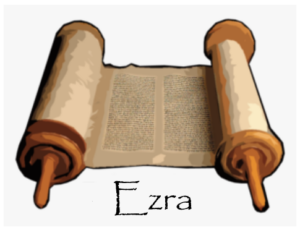
Who wrote Ezra?
Ezra talks about himself in Ezra 7-10 (“Thus I was strengthened according to the hand of the LORD my God upon me, and I gathered leading men from Israel to go up with me.” We can assume that Ezra wrote this book, although a prophet might have added details, etc. in the final collection process of the whole Old Testament.
When did Ezra write this book?
Ezra wrote this book long after the exile was over, which sometimes confuses readers of the Bible. The first chapters in Ezra tell how the first group of exiled Jews returned to Jerusalem and began the work of rebuilding the temple, permitted by King Cyrus of the Medo Persian empire. This happened about 539 BC. A large group of 50,000 exiled Jews returned to Jerusalem and Judah, laid the foundation for the new temple and built a rudimentary altar. God used the Prophets Zechariah and Haggai to stir these Jews to rebuilt the temple at this time, but they did not rebuild the walls of the city nor did they rebuild the city, but left the ruins as they were except for the Temple.
About 80 years LATER Ezra the scribe led another group of exiled Jews to Jerusalem (this happens in Ezra 7-10). Then after another 13 years, Nehemiah came to Jerusalem and began the process of rebuilding the destroyed city walls.
Why did this Ezra write this book?
Ezra tells us the important events which led to the first expedition to Jerusalem led by Zerubbabel, as well as the rebuilding first of the Altar and then of the entire second temple. He then describes the events which ended up being completed by Nehemiah, who organized the rebuilding of the walls of Jerusalem. Apparently, Ezra wished to make sure that future generations appreciated the sacrifices which were made in order to rebuild the temple and then the city as a whole.
Who were the original readers of Ezra?
None of the first readers of Ezra had seen the Temple designed by David and built by Solomon in its glory, but rather a poor imitation. These readers were people living in a harsh environment who had suffered much. This book writes to the generation of those who had dedicated themselves to the task of rebuilding both temple and city and to inspire the next generation to devote themselves to rebuilding Judah.
What led Ezra to write this book?
Ezra wished the current older generation to remember the commitment necessary to return to Jerusalem and rebuild and to stir on the younger generation to devote themselves to completing the work.
What did Ezra want to change in his original readers?
Ezra wanted his original readers to devote themselves to sacrificial commitment to rebuild Judah and Jerusalem, not allowing themselves to be intimidated by enemies or by corrupt officials.
The Post-exilic History
Nehemiah
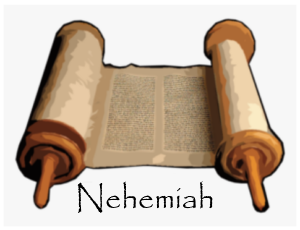 Who wrote Nehemiah?
Who wrote Nehemiah?
Nehemiah talks about himself from the first verse of the book. He was the cup bearer of the King, which gave him a special place of access to the ruler of a vast empire. We must assume that Nehemiah wrote this book, although a prophet might have added details, etc. in the final collection process of the whole Old Testament.
When did Nehemiah write this book?
Nehemiah wrote this book 13 years after Ezra brought his group to Jerusalem, long after exile was over, which sometimes confuses readers of the Bible. The first chapters in Ezra (the book before Nehemiah) describe how the first group of exiled Jews returned to Jerusalem and began the work of rebuilding the temple, permitted by King Cyrus of the Medo Persian empire. This happened about 539 BC. A large group of 50,000 exiled Jews returned to Jerusalem and Judah, laid the foundation for the new temple and built a rudimentary altar. God used the Prophets Zechariah and Haggai to stir these Jews to rebuilt the temple at this time, but they did not rebuild the walls of the city nor did they rebuild the city, but left the ruins as they were except for the Temple.
About 80 years LATER Ezra the scribe led another group of exiled Jews to Jerusalem (this happens in Ezra 7-10). Then after another 13 years, Nehemiah came to Jerusalem and began the process of rebuilding the destroyed city walls.
About 13 years after the last chapter of Ezra, Nehemiah heard of the situation of Jerusalem and brought this matter to the attention of the king. This is where the book of Nehemiah begins.
Why did this Nehemiah write this book?
Nehemiah tells us how he was able to begin the work of rebuilding Jerusalem among great hardships and dangers to inspire his readers to trust Yahweh’s powerful protection and follow Him into whatever task Yahweh commands them to take.
Who were the original readers of Nehemiah?
These are basically the same people who originally read Ezra. None of the first readers of Ezra or Nehemiah had seen the Temple designed by David and built by Solomon in its glory, but rather a poor imitation. These readers were people living in a harsh environment who had suffered much. This book writes to the generation of those who had dedicated themselves to the task of rebuilding the city of Jerusalem as well as the towns of Judah.
What led Nehemiah to write this book?
Nehemiah wished all Jews to recognize the challenges which he faced in rebuilding the walls of Jerusalem so they would devote themselves to the further task of rebuilding the remainder of the city and Judah in general. This was a long process which (according to Daniel 9:
What did Nehemiah want to change in his original readers?
Nehemiah wanted his original readers to devote themselves to sacrificial commitment to rebuild Judah and Jerusalem, not allowing themselves to be intimidated by enemies or by corrupt officials.
The Post-exilic Prophets
1 & 2 Chronicles

Who wrote Chronicles? (It’s 1 book, not 2) The books of 1 and 2 Chronicles in the Old Testament serve as historical records that mostly focus on the lineage of Israel’s kings, the genealogies of the tribes, and the establishment and functions of the temple and priesthood. The author’s main purpose for writing these books appears to be threefold: to provide a comprehensive account of the nation’s history, particularly from a religious and spiritual perspective, to foster a sense of national and religious identity among the post-exilic community, and especially to call his readers to prepare for the coming of the Messiah, who will bring righteousness and peace to the Jews and the entire world
When did this unnamed prophet write Chronicles (It’s 1 book, not 2)? An unnamed prophet wrote this book a long time after the Jews (i.e., Hebrews) returned to Jerusalem under Zerubbabel. It could have been written 450 years before Jesus was born, but more likely was written later, perhaps about 430 year before Jesus or even 400 years before Jesus. Based on the genealogies, which stop at around 400 BC, it was not written any later than that (remember, 400 BC is LATER than 450 BC!).
Why did this unknown Prophet write this book? The history of the human race, especially God’s chosen people the Hebrews, had proven that no institution could withstand the corrupting influence of sin. Long after the exiles of Northern kingdom of Samaria (to Assyria) and Southern Kingdom of Judah (to Babylon), the prophet who wrote Chronicles presented God’s solution, the Messiah, who would be a King after God’s heart (shown in David) who was wise, glorious, peaceful (shown in Solomon). To prepare for this coming Messiah, Israel would need a glorious temple, purified service, proper worship and utter commitment to Yahweh and Yahweh alone.
Who were the original readers of Chronicles? None of the first readers of Chronicles had seen the Temple designed by David and built by Solomon in its glory, but rather a poor imitation. None of the original readers had known the fabulous wealth of Solomon at the height of Israel’s power. Chronicles shows how the idolatry and injustice of the Kings who followed David and Solomon destroyed Israel; only the Messiah could restore them to what they should be.
What led the unknown Prophet to write this book? The writer was calling Israel to prepare themselves for the Messiah by purifying their worship, the Temple, their priests, and their outlooks.
What did this unknown Prophet want to change in his original readers? Similar to the message of the prophets Zechariah, Malachi and Haggai, the Jews must prepare the way for the Lord by putting their hearts and souls into worshiping and glorifying God, especially in their service in the temple and in Jerusalem.
The Post-exilic History
Esther
![]() Esther is a unique book of the Bible, because it never mentions the name of God, never talks about the Law of God (and the main characters seem to have little idea about the Law) and is about people who should have returned to Palestine but were still living in exile.
Esther is a unique book of the Bible, because it never mentions the name of God, never talks about the Law of God (and the main characters seem to have little idea about the Law) and is about people who should have returned to Palestine but were still living in exile.
It almost seems as if the main characters of the Book of Esther know a bit about the God of Abraham, Isaac, and Jacob but little about His laws. They fasted, which shows they knew at least that much, but they never prayed! Esther and Mordecai do not seem to have great faith in Yahweh, since they never mention Him or quote from the Psalms, prophets, or Law. This is in stark contrast to Daniel, who refused to eat Babylonian food (contrary to Esther), was a vocal and courageous witness to Yahweh, was committed to God’s Law and obeyed it, and prayed openly to the God of Israel, asking Yahweh to bring Israel back to Palestine.
One wonders if the author of Esther purposely did not mention God, prayer, the Law, the prophets, the Psalms to highlight that even in their ignorance, Yahweh still remained faithful. Was the original author showing us the spiritual blindness of those Jews who remained in Exile?
Who wrote Esther?
We have no information from tradition or within the book of Esther about the original author.
When did this unnamed prophet write Eshter?
Esther is written to describe the origin of the feast of Purim. It also seems to be written to show how weak was the faith and knowledge about God in those who lived in exile during the days of the Persian Empire.
Who were the original readers of Esther?
Scholars comment on the many features of the Persian Empire known well by the author as if he had actually lived in Persia. Yet, since the book is about the origin of Purim, we cannot be sure whether it was written in exile and brought to Jerusalem or written in Jerusalem sometime after many had returned to Judah. If it is written for the returnees, then these are people living in hardship with threats from those who rejected the Jewish claims on the land and tried to stop the work of rebuilding the Temple and then rebuilding Jerusalem. The lives of these Jews were threatened and challenging.
What led the unknown Prophet to write this book?
The Prophet gives us the origin of Purim and shows how unspiritual were the people who lived in Exile in the Persian Empire..
What did this unknown Prophet want to change in his original readers?
Possibly he wanted his readers to recognize God’s sovereign grace showed mercy on Israel even when those whom He was using were not showing commitment to the Law or even to prayer, unlike the prophet Daniel several generations previously.



